
TUBE FEEDING
Celia Chartres-Aris shares her


MENOPAUSE MATTERS
Managing

Simple,


Celia Chartres-Aris shares her


Managing

Simple,





COVER PRICE £3.00
PUBLISHER
Denise Connelly denise@dcpublishing.co.uk
EDITOR
Melissa Holmes melissa.holmes@dcpublishing.co.uk
STAFF WRITER
Kate Stevenson kate.stevenson@dcpublishing.co.uk
EDITORIAL CONTRIBUTORS
Jane Ha on Samantha Renke
Tim Rushby-Smith Alisdair Su ie
DESIGN AND PRODUCTION
Lucy Baillie lucy.baillie@dcpublishing.co.uk
SALES
Marian Mathieson marian.mathieson@dcpublishing.co.uk
ENABLE MAGAZINE www.enablemagazine.co.uk
DC Publishing Ltd,
198 Bath Street, Glasgow, G2 4HG
Tel: 0844 249 9007

ell, here we are again... January already! Wishing you a Happy New Year, from all of us at Enable. This time of year o en brings with it plenty of reflection, especially around how quickly time passes as we all grow older.
Ageing can bring a whole host of changes and challenges, with increased chances of developing things like hearing loss and dementia. Veteran broadcaster John Stapleton has returned to our screens recently due to his diagnosis of Parkinson’s; another condition typically associated with older people. He cha ed to me about his symptoms, living with Parkinson’s, and his incredible career – I hope you enjoy reading what he had to say. I also spoke to disability advocate Mark Webb about managing the challenges of MS while ge ing older, there’s a focus on the impact of menopause on disabled people, plus we consider the importance of planning for the future in terms of finances, wellbeing, legal aspects and more.
This issue we chat to plenty of interesting people, including deaf model Georgia Meacham, amputee Luke Tarrant, and entrepreneur Ma Pierri. Get inspired by the hopes and opinions of disabled figureheads and Enable’s readers as they share their hopes for 2025, or learn more about how relationships change when one partner becomes disabled. Talking of which, I also take a closer look at the dating scene for disabled people. Till next issue,





25 LIFE ON THE LINE
We mark Feeding Tube Awareness Week by speaking to advocate Celia Chartres-Aris, who recently topped Shaw Trust’s Disability Power 100 list.
48 Cost of Living: TOP TIPS FOR WINTER How you can reduce your financial worries, which can be especially challenging over winter.





8

08 LEARNING TO LIVE WITH IT
TV presenter and broadcaster John Stapleton speaks to Editor Melissa Holmes about his recent diagnosis of Parkinson’s.
10 THE ROAD TO RECOVERY
Luke Tarrant shares his story of adapting to life as an amputee.
30 LUCY’S LIFE
Lucy Linto Smith on celebrating 11 years since her MND diagnosis, and welcoming her third child.
38 THE SOUND OF CHANGE
Deaf model and actress Georgia
Meacham discusses why she hid her deafness for 12 years.
23 SLOWING DOWN
Samantha Renke looks back over her decision to move from London to rural Lancashire, considering the impact it’s had on her life.
28 BE THE GUIDE, NOT THE HERO
Tim Rushby-Smith reflects on the impression that ge ing on with ‘normal’ life a er acquiring a disability can leave on others.
10
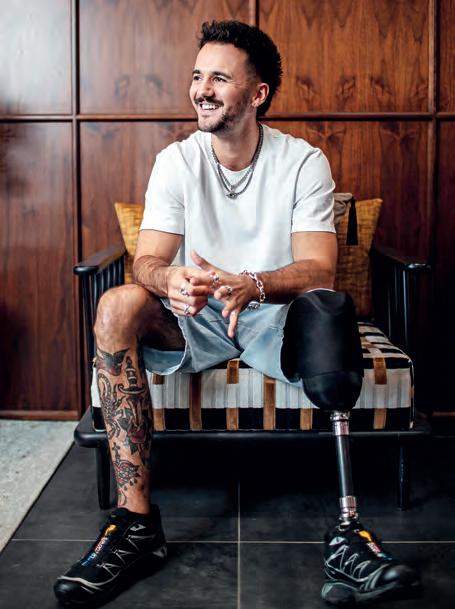
24

51

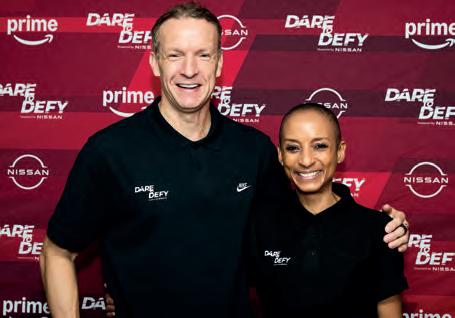
15 FOREVER AND ALWAYS
When your partner becomes disabled, what’s the impact on your relationship, and what support is available to you?
35 PLANNING AHEAD
We take a closer look at the aspects you might like to consider as you age with your disability – from legal needs to housing and finances.
12 OUR SHARED FUTURE
Readers and disability figureheads share their hopes for the year ahead, whether it's politics, financial security, or better life chances.
18 TIME TO TALK
We find out more about Time to Talk Day; a day for friends, families, communities, and workplaces to come together and change lives.
44 SOMEBODY TO LOVE
Disabled people share their stories of the world of dating apps, meetups and marriage.
51 DARE TO DEFY
Athletes Adele Roberts and Richard Whitehead MBE discuss the changes they'd like to see to make sport more accessible for all.
55 PRODUCT PICKS
From adult wipes to all-terrain wheelchair wheels, we uncover the latest products designed to help make your life easier.
56 THE DIARY
What’s worth adding to your calendar in January and February? Featuring mental health awareness days, wonderfully immersive art exhibitions and inclusive sport.
48 COST OF LIVING: TOP TIPS FOR WINTER
The cost of living crisis is still giving many of us cause for concern. But there are things you can do to help reduce your financial worries, which can be extra challenging in winter.
58 MG3
Our car expert reviews the MG3, discovering that the hybrid-powered vehicle puts a spring in the step of the supermini market.


20 OPENING UP CONVERSATION ON MENOPAUSE
We speak to renowned specialist Dr Louise Newson about how menopause impacts disabled people.
24 LIFE ON THE LINE
Disability Power 100 winner Celia ChartresAris shares her experiences of living with a feeding tube.
33 AGEING WELL WITH MS
Mark Webb, who has lived with MS for 32 years, talks about everyday life, his changing perspective on MS, and his hopes for the future.
41 EAT WELL THIS WINTER
Every body needs good food! The best tips for affordable, nutritious and delicious food this winter.
61 SHOULD I TELL?
Jane Hatton gives her advice about disclosing a hidden disability at work.
63 THINK WORK FIRST
Focus on a new report from the House of Lords aiming to prevent young disabled people from being written off while transitioning from school into working life.
64 THE DYSLEXIC THINKING REVOLUTION
The launch of the Dyslexic Thinking University, by Richard Branson and Made By Dyslexia.
66 FINDING SOLUTIONS
Sociability app founder Matt Pierri shares his story of entrepreneurship.

LEGO HAS LAUNCHED a range of toys to support and celebrate fans and colleagues with disabilities, conditions, sensory needs and hidden disabilities. Partnering with Hidden Disabilities Sunflower, the three sets – a LEGO DUPLO airport set, LEGO Friends airport and plane, and LEGO Icons Tudor Corner –were developed with input from experts and individuals with lived experience. They’re the world’s first toys to feature the official Sunflower lanyard, promoting awareness and inclusion across different age groups and themes.
Fans will also be able to
customise minifigures using the Sunflower symbol at Minifigure Factories worldwide, so they can design the character they want to see themselves, a friend or family member represented as.
LEGO fan Martin Moxness (pictured), who has ADHD and Tourette syndrome, said: “Seeing the Sunflower lanyard in LEGO sets is a significant step in normalising hidden disabilities. As a child, this would have been life-changing and would have made me feel seen and accepted. It’s deeply meaningful to see such representation in an iconic product.”
THE CONTROVERSIAL
ASSISTED DYING Bill was passed in early December, with MPs voting to back legalisation for assisted dying in England and Wales by 330 votes to 275, after an emotionally charged debate.
The Terminally Ill (End of Life) Bill will allow some terminally ill adults who are expected to die within six months to seek help to end their own life.
The passing of the Bill was met with mixed responses. Disability Rights UK stand against the law, stating: “This legislation could deepen inequalities and reinforce societal biases that view Disabled people’s lives as less valuable.”
Together for Short Lives said: “We are urging MPs to carefully examine the potential implications the Bill could have

for seriously ill children and young people. Whilst we do not take a position on the ethical and philosophical basis of assisted dying, we believe it is essential that these concerns are addressed.”

RESULTS FROM CLINICAL TRIALS of a drug used to treat asthma and COPD are being hailed as gamechanging by medics. Administering an injection of Benralizumab – a drug which is already in use to treat asthma, but in a different way – has been found to be more effective than giving steroid tablets, reducing the need for further treatment by 30%.
The study’s lead investigator, Professor Mona Bafadhel, of King’s College London, said: “This could be a gamechanger for people with asthma and COPD. Treatment for asthma and COPD exacerbations have not changed in 50 years, despite causing 3.8 million deaths worldwide a year combined.”
As well as being made available in accident and emergency departments, the medication could also be administered safely at home or within a GP practice.













TV presenter and broadcaster John Stapleton speaks to Editor Melissa Holmes about his recent diagnosis of Parkinson’s
John Stapleton is something of a national treasure. From presenting Good Morning Britain and GMTV’s News Hour, to fronting consumer a airs show Watchdog with his late wife Lynn Faulds Wood, and reporting from some of the biggest global news events, John – and his voice – are instantly recognisable.
But John might argue that, these days, you may notice a di erence in his voice – which is how he earned his living for 50 years. He retired a decade ago, but has recently been back on our screens due to his diagnosis of Parkinson’s. John feels it’s a ected the resonance in his voice but, as we chat over video call, I only hear a small di erence in his speech.
“If I’m in a pub or restaurant, I have di culty making myself understood,” he told me. “I have to repeat myself which is rather annoying.” John also has a tremor and some di culty swallowing, and says: “My handwriting has gone to pot.”
Parkinson’s is the fastest growing neurological condition in the world, and currently there is no cure. John is a patron of Parkinson’s UK and, according to the charity, people with Parkinson’s don’t have enough of the chemical dopamine in their brain because some of the nerve cells that make it have stopped working. This leads to a wide range of symptoms – the most common being a tremor (shaking), slowness of movement, and rigidity (muscle sti ness).
John, who is 78, first noticed symptoms – a minor tremor – three years ago, so went to see a neurologist. “They said, ‘It’s what we call a benign essential tremor’. I said, ‘How do you
get that?’ and the neurologist said, ‘We haven’t a clue, but don’t worry about it unless it gets worse’.” The tremor got worse over time, and John was diagnosed with Parkinson’s in April 2024, before deciding to go public about it in October.
“I’d say it was no surprise,” he admits. John’s late mother had Parkinson’s, and he says: “I knew what was coming.” But what did come as a surprise was the reaction of the public when he shared his story. “It wasn’t about ge ing John Stapleton back on the telly, honestly,” he laughs. “It was about increasing awareness of Parkinson’s and encouraging people to talk.”
John and his son Nick (pictured right), who is also a journalist and broadcaster, made a film for BBC One’s Morning Live in which he revealed his diagnosis. The pair had been discussing what John may need in the future: “You know – will I need a stairli , will I be able to continue living in this house, will I be able to continue driving?” and the father and son decided to make a film about it.
“I was absolutely staggered by the reaction to be quite honest with you, I never imagined anything like that would happen,” John reveals. “It was picked up by more than 200 di erent media outlets, both national and regional. I’ve had hundreds of messages and calls… which is great because that’s what it was all about.”
John says that, although Parkinson’s only a ects 153,000 people in the UK, many others are widely impacted. “You spend your life looking a er your kids, then your kids have to look a er you,” John admits. “It’s possibly not








Parkinson's isn't going to go away, so I'm learning to live with it
something you want to confront, but you have to have those conversations about what the future may hold, which is what Nick and I did.”
John feels that men in particular can be: “very bad at this kind of thing. You’ve just got to be very frank, and address whatever’s crossing your mind. If you can’t share these concerns with your own kith and kin, who can you share them with?”
Lancashire-born John has taken a pragmatic view about his diagnosis, explaining that his wife Lynn used to say there’s no point in worrying about things you can’t change. “I’ve kept that in mind,” he muses. “Parkinson’s isn’t going to go away, so I’m learning to live with it; make the best of it.”
John is taking medication to help manage his symptoms. He's also working with a speech therapist and keep fit expert, who has Parkinson’s herself. “I’ve never been that fond of exercise to be quite frank, but I’ve got to learn to live with that. I’m taking all the best advice I can.”
One of the biggest challenges he faces is ge ing dressed in the morning. “It’s not as easy as it was,” John tells me. “Fastening your shirt bu ons – that becomes a challenge. Peeling a potato becomes a challenge. Fastening zips… I hate zips,” he admits. “Ge ing the zip locked and fastened up on your overcoat, particularly in weather like this, that can take a long time.”
Like many people a ected by Parkinson’s, John may eventually need to stop driving. He says he’ll continue to watch his favourite football team (Manchester City) in action as o en as he can: “They’re not doing too well at the minute but I’ll keep the faith… as ever.” John keeps busy with his social life and told me: “Since that film went out, I’ve been absolutely inundated with o ers of dinner and lunch. It’s been charming. As long as I can, I’ll keep going.”
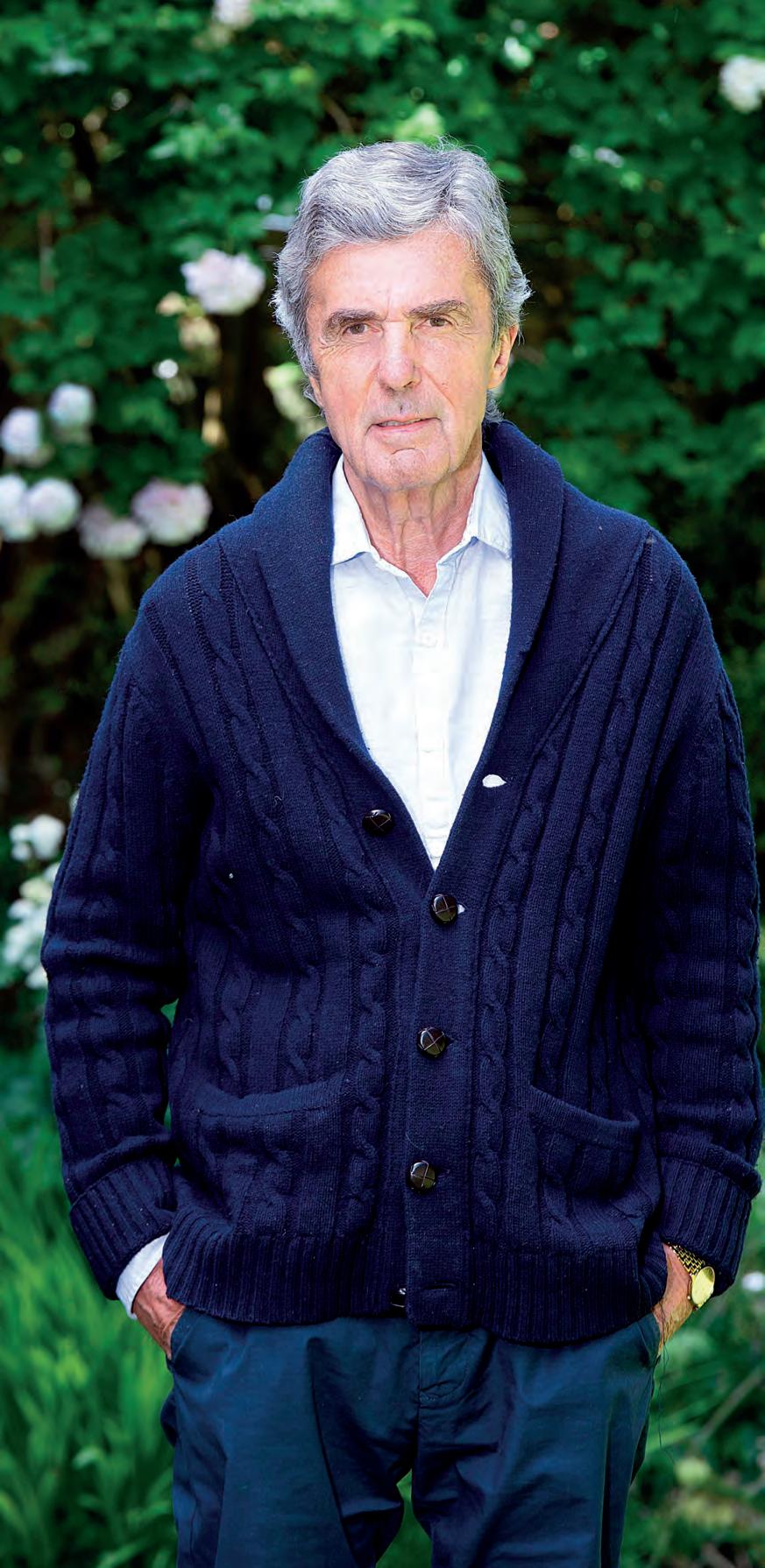
In May 2024, Luke Tarrant lost his leg in a motorcycle accident while travelling through South America. He speaks to Kate Stevenson about his incredible journey so far
Just five months after leaving hospital, Luke Tarrant is already planning his return to the open road. On a solo adventure that was meant to take him all the way to Antarctica, Luke had a devastating motorcycle crash in Colombia which cost him his leg and left him with complications like sepsis. But his resilience is as striking as his story. Others clearly agree – as Luke shares his journey on social media, he’s gained a massive following.
Luke’s rise to Instagram stardom was unplanned. “After my accident, my parents started updating my account to keep my UK friends in the loop,” he explains. As his follower numbers increased, Luke’s strength also grew. Recovery was far from straightforward though, and he remained in Columbia for several weeks before he could be transferred back to a UK hospital.
Eight surgeries later, when Luke was back on home soil, he found the
We all die eventually –I’d rather live fully, doing what I love, than play it safe and regret it

time to reflect: “At first I was excited to be home but, when I finally sat in my flat, it hit me: nothing about my life was normal anymore. I hadn’t just lost my leg; I’d lost the life I once had,” he confesses. “One night, I woke up and couldn’t even get through my bathroom door in my wheelchair. That moment broke me,” Luke admits.
Luke shakes his head as he remembers; the rawness of his very recent accident is clearly still fresh in his mind.
“The best times of my life have been on my motorbike,” he continues. “People think I’m mad for wanting to get back on one, but I’ve realised life’s fragile anyway. We all die eventually – I’d rather live fully, doing what I love, than play it safe and regret it.”

Although he says he “always wanted an interesting life, not necessarily an easy one,” adjusting to life with a prosthetic limb has been a steep learning curve. He admits getting back on his bike might take longer than he first thought: “I prefer to wear my prosthetic – I feel small and cut off from the world in my wheelchair – but it’s not always possible. My stump changes shape, so if I use the leg for a day, I might be off it for three. And sometimes, my brain still forgets it’s not there. I’ll slip or reach for it, and there’s just… nothing.”
It’s clear that, while Luke’s recovery is still a work in progress, he’s not waiting around. He’s already started training for the British Indoor Rowing Championships, and has been talking with Paralympic coaches about a future in competitive sports.
Luke’s biggest goal? Returning to Colombia to finish his journey to Antarctica. “It might take years, but I’ll do it. I want to stand at the end of the world, knowing I didn’t give up.”


Jon Sparkes OBE Chief Executive, Mencap
“In addition to delivering vital social care support services for people with a learning disability, as 2025 kicks off, Mencap will be focusing our efforts on ensuring the NHS 10 year plan addresses the unacceptable health inequalities faced by the 1.5 million people with a learning disability in the UK.
“We want 2025 to bring about changes to the social care system so those who access it can be supported to live happy, healthy lives in their communities –paying people who work in social care on a par with their NHS colleagues, fully funding social care for disabled adults, and starting a fundamental review of adult social care. We will also continue to campaign to end the scandalous treatment of people with a learning disability who are wrongly detained in mental health units, even when they don’t have a mental health condition.
“People with a learning disability face discrimination daily. There’s no place for these attitudes in our society, and Mencap will not stop until all people with a learning disability are free from inequalities and discrimination.”
Jay Howard Disability advocate
“I’d like to see more disabled people represented in the media, so we can show the rest of the world who we are and how many of us there really are. We deserve to be seen and heard. It’s so important that we teach children to be kind to people who might look or live differently, and the only way we can do this is by helping them understand what disabilities are. In turn, we can inspire disabled children to feel proud of who they are and show them they can live amazing lives, no matter what challenges they face.”
Molly Bostock Reader
“I’d love to see more awareness around invisible disabilities or illnesses in 2025. A lot of people don’t understand that someone can ‘look’ fine, but still be dealing with serious challenges. These misconceptions make life even harder for people with invisible disabilities. Whether it’s struggling to work, go to school, or even just getting out and socialising, these incorrect perceptions can make daily situations more difficult to navigate. It’s important we show what life is really like for people with these conditions, so others can understand and start to see things differently.”
Rhiannon Neale Columnist
“As a parent of a three-year-old with multiple disabilities (but not being part of the disabled community myself), I would love to see a difference in the family support around new diagnosis, around proactive therapies and support for disabled people, a focus on accessibility both in the realm of mobility and in education, and a lot more awareness from the people who have the power to spread it the furthest (like the media and government).
“For us, 2024 was the hardest year of our lives. I know many have paved the way before us and had it much harder. I also know this is a new fight for us, and others must be exhausted from fighting for so long.”
For us, 2024 was the hardest year of our lives
Rhiannon Neale
Thomas Walsh Reader
“I wish for improved financial security and more/better life chances for disabled people, rather than being held back by the threat of sanctions, or benefits being cut simply for living life.
“I experienced a traumatic brain injury aged 22 and, since then, I’ve relied on benefits to survive. But the strict rules limit my independence and quality of life. Despite earning a master’s degree, I live with my ageing mother, and I’m unable to afford housing, save, travel freely, or marry without risking economic sanctions. These restrictions deprive me of meaningful choices and dignity, raising critical questions about the government’s focus on preserving life while neglecting the right to a quality of life for disabled people living in poverty and isolation.”
Head of Policy, Disability Rights UK
“Disabled people make an amazing contribution every day to work, family and community. We could do even more if society gave us the right support and was more inclusive. Far too many of us have to struggle to get by, and don’t have the bandwidth to meet our potential.
“Disabled people’s organisations and Disabled activists will continue to fight for change in 2025. We will demand that politicians and decision makers talk to us about what we need and what would make a difference to our lives. We will campaign for higher benefit levels, increased funding for social care, additional educational support, and investment in accessible housing. We will continue to make the case for a more equal and accessible society, where barriers to education and employment are swept away, where we all have safe access to streets and public transport, and where information and communication are in formats we can access.”
Director of Strategy, Scope
“2025 could be crucial in setting the relationship disabled people have with our government.
“In the spring, we’re expecting a consultation on welfare that is likely to include up to £3bn in benefit cuts, which will create anxiety and fear. Our benefits system is broken and needs fixing, but starting with a cut isn’t the way to go about it.
“In 2025, we want government to set out a positive vision for supporting disabled people into work without demonising those who can’t. Extra costs for disabled people haven’t gone away. Our energy costs remain eye-wateringly expensive, and the prospect of discounted energy bills for disabled people remains some way off; despite organisations like Scope calling for a social energy tariff for years.
“In May, the Scope Awards will shine a light on all those working towards an equal future.”
Vehicles, Cars & Adaptations
Ford Connect
Rear Wheelchair Passenger
•Flexible seating with two ISOFIX in mid-row
•Rear entry with manual, anti-slip ramp
• Class leading quality and headroom (145cm)
£7,795

Ford Connect
Combined Drive From Wheelchair/Upfront Passenger
•Drive from your wheelchair
•Switch from driver to upfront passenger
• Automated tailgate and ramp

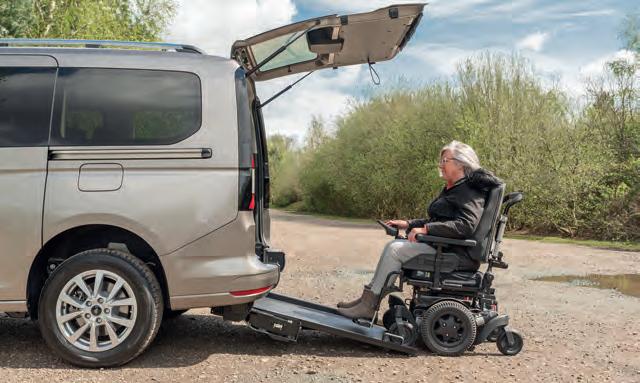
Ford Connect
Upfront Wheelchair Passenger
•Side entry, ISOFIX in mid-row & spacious boot
• DAB radio with 10” touch screen, air conditioning
• Front and rear parking aids, 16” alloy wheels

•UK’s only wheelchair accessible car
•Extreme SE model for premium ambiance
•Latest infotainment systems including Apple Car Play
£5,595


Deciding to spend your lives together means choosing to support each other ‘in sickness and in health’. When your partner becomes disabled, what’s the impact on your relationship, and what support is out there?
All relationships change over time. Whether you choose to cohabit or not, get married, have children or stay child-free, being with someone can bring all sorts of experiences and emotions. The longer you’re together, the higher chance you have of one of you developing a health issue or disability, which can put pressure on even the strongest relationship.
The latest estimates from the Department for Work and Pensions’ Family Resources Survey found that 23% of working age people and 45% of
people of State Pension age were disabled. Those figures mean a lot of individuals and spouses/partners will be adapting to a change in their relationship dynamics due to the onset or acquisition of disability.
Suzanne Bourne cares for her husband Matt, who lives with Parkinson’s. She says: “When caring for a spouse or partner, your relationship may change. This will look different for everyone, depending on factors like your loved one’s diagnosis and your own age
and health.” Suzanne is also Head of Carer Support and co-founder of the UK’s largest community of unpaid carers, Mobilise, so she knows a thing or two about how relationships can change when one partner becomes a carer for their loved one.
When you become a carer for your partner, you may be flooded with different feelings. Suzanne explains: “Adjusting to your new dynamic, and the duality of being both a carer and a partner, can often take time and stir up mixed emotions. It’s important to remember that whatever you’re feeling is valid. It’s also completely ok to grieve the life and plans you had before, especially at first.”
She recommends joining communities of carers, where you can connect with people in similar situations, share experiences and gain advice, as these can be a great source of support and help. “Being part of a community can also help to ease loneliness, if this is something you’re experiencing as a carer,” she recommends. You can find support, both online and in person, through Mobilise, your local carers centre, or via Carers UK.
Because of the responsibility of caring, there may be times when you feel like a carer first and a partner second. If this is the case, communication is key, explains Suzanne: “Talking openly will enable you to work through issues together and reconnect. Looking through photos, reminiscing about cherished memories, or organising a date night can help rekindle your relationship as a couple.”
The role of laughter can’t be underestimated either. “Humour can serve as a bridge between you, and help to ease tricky moments,” says Suzanne. “For example, if you’re assisting your partner with personal

care, a touch of levity can put them at ease and alleviate any feelings of embarrassment or resentment around needing help.”
Protecting your physical and mental health is vital as a carer – the responsibility of often being the sole source of support for your loved one means that taking care of yourself becomes paramount. You can speak to your nearest carers centre about things like safe lifting techniques, or enquire with your local authority about having a Carer’s Assessment and/or occupational therapy assessment, to ensure you’re getting the support you’re entitled to.
When you become a carer, it impacts every aspect of your life – in some areas you may not have even thought about. The physical and mental load of caring can be an issue, as Suzanne suggests: “It can be challenging if you can no longer share household tasks with your partner. Don’t be afraid to seek support from friends or family, for example, if you need assistance with life admin.”
Adjusting to your new dynamic can stir up mixed emotions
Then of course there’s the financial impact to consider. “On the practical side, if your partner is no longer well enough to work, or you need to reduce your hours to focus on caregiving, the loss of financial income can be worrying,” reveals Suzanne. “Finding out what financial support you’re entitled to will help you feel more in control of your finances and reduce some worries.”
The benefits system can be tricky to understand, so it’s worth using a benefits calculator like the one online at entitledto.co.uk, or speaking to Mobilise or your local carers centre for advice. Suzanne outlines the current situation: “There’s a range of support for unpaid carers. Carer’s Allowance is the main benefit available to people caring for a loved one or relative. It’s currently offered at £81.90 per week and is rising to £83.29 from the 6th of April 2025.” Suzanne points out that there is an earnings cap for this, but there is other support available, which can be claimed in addition to or instead of Carer’s Allowance if you’re eligible for it. “This includes Carer’s Credit, Carer’s Element, and Pension Credit (otherwise known as ‘Carer Premium’),” outlines Suzanne. “Grants from local councils, council tax discounts, and heating benefits are also available.”
Becoming a carer to your loved one may be a gradual change or a sudden one. But whatever your circumstances, there is help out there, and you’re not on your own. Remember that your feelings and emotions are totally valid, and you should never be afraid to reach out for help. Caring for a spouse or partner is demanding but rewarding, so be proud of yourself that you’re doing your best for your special person when they need you most.










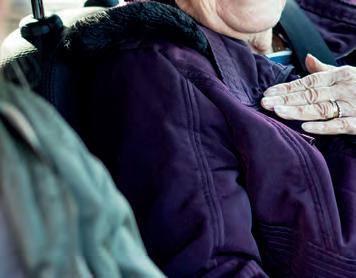


Time to Talk Day takes place on 1 February. It’s a day for people to come together to talk, listen and change lives. The event is run by Mind and Rethink Mental Illness… We find out more
reating a safe space is key to having a supportive conversation about mental health, especially on Time to Talk Day, when we’re reminded of the power of opening up.
There are lots of ways you could start a conversation. Perhaps you’ll have a chat while you’re carrying out an everyday activity, or you can share a cup of tea with a loved one, or simply text a friend to see how they’re doing. While there’s no right or wrong way to talk about mental health, there are some tips that can help, as Stephen Buckley, Head of Information at Mind shares with us:
If someone opens up to you about their mental health, it might be uncomfortable to start that conversation. But it doesn’t have to be – just being there for someone can make a big di erence. If someone does confide in you, there are a number of things you could do: Ask questions and listen. Asking

questions can give the person space to express how they’re feeling and what they’re going through. Try to ask questions that are open and not leading or judgmental, like ‘How does that a ect you?’ or ‘What does it feel like?’.
Don’t try and fix it. Try to resist the urge to o er quick fixes to what they’re going through. Just talking can be really powerful so – unless they’ve asked for advice directly – it might be best just to listen.
Be patient. No ma er how hard you try, some people might not be ready to talk about what they’re going through. That’s ok – the fact that you’ve tried to talk to them about it may make it easier for them to open up another time.
It can be hard to open up and share your feelings. Whenever you feel ready, these tips might help you get comfortable starting that conversation: Find a way that feels right for you. This could be a face-to-face conversation, or you might find it

easier to talk on the phone or even write down how you feel.
Find a suitable time and place. Sometimes it’s easier to talk side-byside, rather than face-to-face. You might want to chat while you are doing something else, like walking, driving, or cooking. However, don’t let the search for the perfect place put you o .
Be honest and open. It can sometimes feel uncomfortable sharing something so personal, but explaining how your feelings are a ecting your life may help others to understand.
If you’ve noticed changes to your feelings, thoughts or behaviour that are a ecting your daily life, talk to someone you trust. Contact your GP, or you can call Mind’s confidential Infoline on 0300 123 3393. Mind’s Support Line also provides a safe space to talk with trained advisors on 0300 102 1234.
For information about Time to Talk Day, including tips and resources to help start a conversation, visit www.timetotalkday.co.uk / #TimeToTalk













With the subject of menopause rarely out of the news, Editor Melissa Holmes speaks to renowned specialist Dr Louise Newson about how it impacts disabled people
Menopause is finally ge ing its moment. A er decades of being dismissed as ‘women’s problems’ or simply referred to as ‘the change’, the medical world and the media are waking up to the impact this important life stage has on women, transwomen, and non-binary people.
But, as with many issues around health inequalities, the a ention paid to how menopause a ects disabled people has been somewhat lacking. Overlapping symptoms, challenges around communication, and inadequate education – on both sides – are some of the issues disabled people face when it comes to managing the menopause.
Dr Louise Newson is one of the UK’s foremost menopause specialists, and has a deep understanding of how menopause impacts disabled people. She told us: “Menopause has been overlooked for years, especially by doctors who think it’s nothing more than night sweats. I don’t need to tell you there are many di erent disabilities but, for disabled people, menopause symptoms are o en put down to their disability.”
Menopause happens when you stop having periods and your ovaries stop producing eggs so you can no longer get pregnant. This happens due to hormonal changes, and can lead to a wide range of symptoms.
While the woman is experiencing symptoms, she’s referred to as perimenopausal. When she gets to a point where she hasn’t had a period in 12 months, she has hit menopause.
So what sort of symptoms do people experience? Most of us know about hot flushes and night sweats, but you can also be a ected by brain fog, headaches, aches and pains, palpitations (fast heart rate), mood changes like anxiety and low mood, loss of libido, a dry and painful vulva and vagina, and trouble sleeping.
If you’re experiencing a combination of these symptoms and think you may be starting with perimenopause, your GP should be your first port of call. You might feel more comfortable taking a friend or carer along who can advocate for you. Your GP may put you on treatment – o en hormone replacement therapy, or HRT – or suggest lifestyle changes to help you manage your symptoms.
The average age for a woman to have the menopause is 51, and women generally start experiencing perimenopause symptoms in their early 40s. But these symptoms can start at a younger age, and menopause is more likely to happen early if the woman has Down Syndrome or Addison’s disease.
Dr Newson, who is a member of the UK Government’s Menopause Taskforce, relates how she recently headed up a webinar for people living with cerebral palsy. “Many of them were saying that their muscle tone was increasing, their strength was reducing, they were ge ing all these other symptoms, but they were told ‘It’s just your cerebral palsy’,” she exclaims. “But if it’s been stable for years, why would it suddenly flare?”
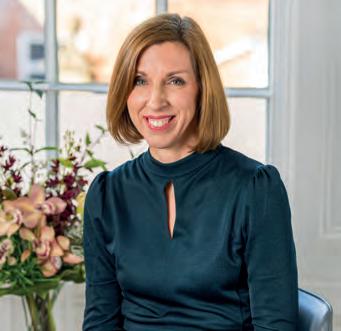
Dr


Dr Newson believes that disabled people are more aware of their bodies, so are more able to pick up on any changes or be aware of new symptoms. “Most people wouldn’t notice a small reduction in muscle strength, for example,” she explains. “But if they’ve got a disability that’s a ecting their muscles, they’re going to notice it more.”
Managing menopause can pose more of a challenge for people with communication di culties. “If they can’t communicate, then their behaviour might be changing because of the way they’re feeling – either they’re in pain or they’ve got anxiety – and they can’t verbalise what’s going on,” Dr Newson outlines. “It can be very di cult because your carers won’t necessarily understand, and your
For disabled people, menopause symptoms are often put down to their disability

symptoms might be put down to something else.”
She suggests that, if someone is physically immobile or in a wheelchair, their carers might see it as one less thing to think about if the person they care for isn’t having periods anymore. “They’re not thinking that perimenopause could be why they’re getting urinary incontinence or why they’re not sleeping so well,” she says.
“The more I speak to people with any disability, the more I realise there are so many barriers,” reveals Dr Newson. “It’s often the misunderstanding that’s the biggest barrier.” A lack of understanding around HRT and the way it might interact with certain medications or certain disabilities or comorbidities is one of the main
issues, and the physician says: “The risks of not having hormones [HRT] are usually higher than the risks of actually having them.”
She also describes how different specialities don’t ‘speak to each other’ when it comes to menopause care, saying “Traditionally, it’s been gynaecologists that ‘own’ the menopause, but they’re often not so aware of the needs of a disabled person. Then the doctors who look after disabled people have probably had no menopause training. That’s a massive problem across all specialities.”
Dr Newson’s clinic offers an online education programme that’s been downloaded by more than 33,000 healthcare professionals.
With the public conversation around menopause opening up thanks to celebrities like Davina McCall, Dawn French, Oprah Winfrey and Angelina Jolie sharing their experiences, it seems that awareness and understanding are on the rise.
And, as with all things, as awareness increases in ‘mainstream’ circles, awareness of how menopause affects disabled people will continue to increase too, which can only be a good thing for the thousands of people who go through it every year.
Balance: balance-menopause.com / instagram.com/balancemenopause
Dr Louise’s website: drlouisenewson.co.uk / instagram.com/menopause_doctor




Join thousands of other disabled councillors who are able to improve their local communities, in so many ways.
To find out more visit bit.ly/be_a_cllr | @beacouncillor








































A collection of stylish wheelchair adaptable apartments available with Shared Ownership*, designed to make living in London the best it can be.
With great layout options that accommodate wheelchair users, rest assured you will find the perfect home at Glengall Rise.
Our accessible homes offer:
• Step-free access, with wider doors and hallways
• Space to charge and store two wheelchairs
• Lower switches and higher sockets
• Larger bedrooms to enable wheelchair access
If you reserve your home offplan, you may be able to have an adjustable kitchen** installed to suit your needs, ready for when you move in.
Bathrooms are designed with plumbing and drainage fitted so that a level access shower can be installed if required.













Samantha is a broadcaster, actress, disability activist and the author of ‘You Are the Best Thing Since Sliced Bread’. Follow Samantha on Instagram @samantharenke
Columnist Samantha Renke looks back over her decision to leave the big smoke for the countryside, and considers the impact it’s had on her life over the past 12 months
This time last year, I wrote about my desire for a slower pace. I’d just moved from London back to rural Lancashire. I was craving a calmer, slower life.
As someone who battles with anxiety, something had to give before I burned out. A more manageable lifestyle would benefit my overall health. As a Disabled woman, I constantly found myself working at a pace that didn’t fit my body. I felt the pressure to keep up with my nondisabled / pre-disabled peers.
I wanted to offer an honest reflection on the past year. Transparency is key –I’d hate for anyone to see my life online and feel they should be doing more, or are failing at things, without me giving them the full, unedited truth.

Living closer to nature has helped me immensely. Each day I become immersed in my garden watching the squirrels and birds get up to mischief. My cats are so much calmer now they have space to roam. And having an accessible park on my doorstep is a gamechanger.
I felt almost claustrophobic in my London home. Going out all the time left me with anxiety due to the expense of living, and because of the complexities of navigating a busy city as a wheelchair user.
I was lucky to have found an accessible home in the capital, but almost felt guilty because I ended up not being truly happy.
Logistically, life is more complex in terms of organising my travel, support and reasonable adjustments. But I’ve learned to lean on my support team more. As a people pleaser, I always accepted invitations or work commitments. Now I know it’s not practical or feasible to say yes to absolutely everything.
Financially, I’m worse off now that I don’t say yes to it all. It seems only time will tell if this will impact my future choices, since I have bills to pay, just like the next person.
I still worry, but I don’t let FOMO dictate my life choices anymore
Now, my home is my castle. I don’t feel trapped. The lack of convenience on my doorstep has allowed me to unburden myself from social pressures.
A two-and-a-half-hour commute into London as opposed to a twentyminute taxi ride for work has allowed me to have more agency in my life. This means I now get to say ‘No’ a lot more.
I don’t believe Disabled people can fully take the time and space they need to live an authentic Disabled life. The world isn’t set up for us, and we can face ableism for asking for a slower pace. I constantly find myself explaining my decisions or justifying my needs.
I still worry a lot, but I don’t let FOMO dictate my life choices anymore.
There are more than 40,000 tube-fed people in the UK, and it can be one of the most isolating disabilities. Celia Chartres-Aris, who topped Shaw Trust’s Disability Power 100 list in 2024, speaks to Kate Stevenson about her experiences
Every day of her life is meticulously planned and controlled – it’s essential for Celia’s survival. Born with Loeys-Dietz Syndrome (LDS), she completely relies on Total Parenteral Nutrition (TPN) to receive nutrition directly through her veins.
Living with LDS can feel like you’re living on borrowed time – the average life expectancy for people born with the condition is just 37 years. But, at 28, Celia refuses to let the syndrome slow her down. Instead, she’s using the time she has to tackle the stigma surrounding feeding tubes.
“I’m not extraordinary,” Celia says with characteristic modesty. But spend five minutes in her company, and it’s impossible not to feel inspired.
Every day of her life is a masterclass in resilience. Since her teenage years, Celia has relied on feeding tubes. And, for the past four years, she’s been unable to consume any food at all – she solely depends on her central line to receive the nutrition her body needs.
“My entire schedule revolves around my infusion,” she reveals. “For five years, I’ve not slept past 6:30am – that’s when I unplug. By 5pm, I’m back on.
“There’s no flexibility – I have to unplug and plug in at the same time every day, no matter where I am.”
Life on TPN is far from straightforward. Unlike traditional feeding tubes, a central line comes with risks such as infections, blood clots, and line blockages, so it requires surgicalgrade sterility. Even “a speck of dust could be enough to cause sepsis”, but finding suitable spaces to set up her equipment when she’s out of her home can be next to impossible for Celia.

“Travel is a nightmare,” admits Celia. “Two weeks away means packing 50 litres of fluid, needles, and everything else I need to stay alive. At the airport, I’m often strip-searched because security staff don’t understand what I’m carrying.”
But rather than wallow in frustration, Celia focuses on what she can control: “It’s tough, but I’ve learned to adapt,” she smiles. “I might not be able to eat, but I still enjoy hosting dinner parties and baking for my friends. It’s my way of staying connected.”
Loeys-Dietz Syndrome (LDS) is an extremely rare genetic condition that affects only 70 million people worldwide. It impacts the connective tissue, and can lead to complications in the heart, blood vessels, bones, and gastrointestinal system.
Anything related to bowels, digestion, or eating habits is still so taboo
Celia’s experiences have made her a fierce advocate for those living with feeding tubes. When she was growing up, she didn’t see anyone like her in the media: “I felt invisible, and that was isolating.” It also meant that few people understood the challenges she faced in her everyday life.
Determined to change that, she’s speaking openly about her struggles and the hurdles she has encountered: “People assume feeding tubes are temporary or just for those with eating disorders,” she adds. “I’ve had people yell, ‘Are you anorexic?’ at me on the street. It’s horrible.”
Celia believes that part of the problem is the public perception surrounding gastrointestinal health. “Anything related to bowels, digestion, or eating habits is still so taboo,” she says, and she thinks this is the reason people avoid learning more about tube feeding. “But the lack of conversation creates barriers – not just in public understanding, but also in how the media represents people like me.”
Perhaps the hardest aspect is the social isolation it can cause. “Food is such a cornerstone of our culture,” explains Celia. “When you can’t eat or drink, it’s easy to feel left out. I’ve lost friends because they didn’t know how to include me anymore.”
The lack of understanding isn’t limited to friends and family. Celia recalls being kicked out of restaurants for not ordering food, and being stared at in public. “I’ve even had strangers pull on my line, asking, ‘What does this do?’ It’s invasive and dehumanising.”
Understandably, everyday life isn’t easy for Celia, and she’s been candid about the mental toll it’s taken. “At first, I avoided everything – parties, dinners, even coffee dates. I felt like I was ruining the fun for everyone else,” she recalls. “I used to cover up my central line

because I didn’t want people to stare.”
But, over time, Celia has found ways to regain her confidence. “Eventually, I realised I wasn’t the problem. Society’s discomfort was,” she says. “Now, I wear what I want. If someone doesn’t like it, that’s their problem.”
While Celia strongly encourages anyone struggling to consult a medical professional, she acknowledges that “the NHS doesn’t provide enough resources to help people cope.” Instead, she offers this advice: “Don’t shut yourself away. You’re just as valuable as anyone else. Find joy where you can, whether that’s hosting a
dinner party, or simply showing up for your friends.”
Ultimately, she hopes that, one day, the systemic barriers preventing tubefed people from fully living their lives will disappear. Offering more mental health support, improving awareness, and greater societal flexibility are crucial steps towards that goal.
“I want people to realise that being different is the one thing we all have in common. Let’s start embracing it instead of shying away.”
Stay at Jersey’s accessible hotel and explore an island full of history, culture, inclusive activities
There aren’t many places in The British Isles where you can enjoy dolphin-spotting, beautiful beaches, historic fortifications, a world-famous zoo and celebrated local cuisine, all on the same holiday. But in Jersey, you can. What’s more, many of the island’s activities are inclusive and accessible, with specially designed beach wheelchairs, assisted surfing, and adapted boat trips available for everyone to enjoy.
The Island also has a wonderfully equipped modern hotel, designed specifically for disabled people. Located in the pretty parish of St Ouen, overlooking Jersey’s National Park, Maison des Landes combines the relaxing atmosphere of a modern hotel with the very latest facilities, including wheel-in en suite wet rooms, ceiling tracking, and a large accessible pool.
The hotel is set in tranquil gardens with beautiful views and has an excellent restaurant. Jersey is renowned for its good food, and Maison des Landes is no exception. Head chef Martyn and his team use fresh produce to conjure up culinary delights that keep guests smiling.
The hotel’s management team place great value on the comments they receive from guests, so were delighted to receive the following feedback from the Flint family from Manchester after they’d stayed at Maison des Landes last summer:
“Thank you Maison des Landes for such a wonderful holiday, in a beautiful hotel with amazing staff who couldn’t do enough to help. We can’t wait to book again. Jersey
is an incredible island with the most amazing views and friendly people. It was so good to be away where the hotel facilities worked for Lewis and meant everything in the hotel and grounds was accessible to him. It’s hard to express how much it meant to our family.”
The Flint family certainly made the most of their time in Jersey, and it’s easy to see why. The hotel’s daily programme of organised activities includes visits to Jersey Zoo, the Maritime Museum and Jersey War Tunnels. Guests are also able to explore the Island’s marine environment through boat trips with WetWheels, which takes groups out in a specially adapted catamaran; and visitors can try assisted surfing with ocean therapy group Healing Waves.
A fleet of adapted minibuses provides hotel guests with transport around the Island, as well as transfers to and from the harbour and airport. And transport links to Jersey are good, with ferry operator DFDS providing routes from Poole and Portsmouth, and various regional airports offering direct flights to the Island.
Maison des Landes is run as a charitable trust with the aim of providing holidays in Jersey for people with disabilities. The charity’s trustees are committed to offering value for money, so accommodation rates for 2025 have been kept at 2024 prices. There are also some exciting offers and deals available on the hotel’s website, including a 10% discount for 2025 guests who book and pay for their holiday before the end of March.
So, come and explore Jersey – the accessible Island with so much to offer.












The only hotel in Jersey designed specifically for people with disabilities, Maison des Landes provides the relaxing atmosphere of a modern hotel and the very latest facilities. And if you book and pay for your 2025 holiday before March 31st you’ll save 10%.
The hotel offers daily activities and entertainment, an excellent restaurant, a large accessible pool and tranquil gardens overlooking Jersey’s National Park. Visit our website for special rates and deals.



‘Thank you Maison des Landes for such a wonderful holiday, in a beautiful hotel with amazing staff who couldn’t do enough’
DAWN FLINT, MANCHESTER



A new collection of luxury wheelchair accessible homes at London’s brightest new place to live in Phase 4 of White City Living.
• 1–2 bedroom apartments acceptability inside and out as a fundamental principle
• Set in eight acres of landscaped gardens and a new five acre park
• Next to Westfield London
• Next to Imperial College London’s new 23 acre campus and within 30 minutes of four of London’s top five universities
• Two Zone 2 Tube stations next to White City Living
• Private residents’ facilities including beach & pool
• Dedicated Blue Badge parking is available*
For more information on apartment sizes, layouts and other specifications please contact us:
020 3002 9462 whitecityliving@stjames.co.uk

Originally from London, writer, artist and paraplegic
Tim Rushby-Smith is based in Australia. He is the author of two books: Looking Up and Beyond the Break.
Follow Tim on X @trushbys

Not all heroes wear capes… Tim Rushby-Smith reflects on the impact that getting on with ‘normal’ life after acquiring a disability can have on others, especially those who’ve recently become disabled
We all need a hero sometimes. But we also need to learn about our own strengths.
I wear many hats (not literally, and not all at once), one of which is as a trainer of peer trainers. I was fortunate enough to benefit hugely from the support offered to me by other people with spinal cord injury, which helped me to begin to imagine a life after sudden disability.
Similar support exists both formally and informally in many settings, but there are ways to ensure everyone gets the best possible support, regardless of their circumstances.
In order to achieve this, there are some key principles, one of which has always resonated with me. It can be summed up with this memorable phrase: ‘Be the guide, not the hero.’
Don’t get me wrong; heroes are
important. For children in particular, seeing someone with a similar disability excelling in any field can have a huge impact. A big part of that can come from feeling ‘I can have a hero I identify with too’. It helps them to be able to dream big.
But I’ve also seen heroes have a negative impact. I saw people showing off their wheelchair skills in a way that was not at all helpful to people who had only recently found themselves in wheelchairs.
I also saw the other edge of the double-edged Paralympics sword, namely people who resented others making suggestions (light-hearted or otherwise) that they could be a Paralympic athlete one day, in a way that is never suggested to the wider population during the Olympics.
One of the things that motivated me to write my first book was the
abundance of stories of people with disabilities overcoming the odds to scale mountains or set new world records. This wasn’t a negative impact, but rather it didn’t feel that relevant. All I wanted to do was get back to a ‘normal’ life, and so that’s what I wrote about.
Instead of being inspiring, the wrong words at the wrong time can be alienating. Luckily, there are simple and effective ways of reducing the likelihood of this happening. Listen. Find a connection. Find what lights someone up and offer support and guidance with it front of mind.
Heroes are great. They can inspire us, or even help us to escape into our imagination.
But we don’t always need a hero. Sometimes we just need someone to hold our hand and show us the way forward.
is waiting for you at







Create lifelong memories that bring you together, one adventure at a time. Join us in 2025 for fun-filled activities in a truly inclusive setting in Devon.

Book Now (quote ‘ENABLE’ for the best deals)
01598 763221

Lucy Lintott Smith was just 19 when she was diagnosed with Motor Neurone Disease (MND), making her the youngest person in Scotland to be diagnosed with the terminal neurological condition. Editor Melissa Holmes caught up with Lucy, soon after the birth of her third child
Being diagnosed with a progressive, terminal condition at the age of just 19 would change anyone’s perspective on life. Scotland-based Lucy Lintott Smith recently turned 30, had her third child, and hit the incredible milestone of 11 years since her diagnosis of MND. “It's still very surreal,” admits Lucy. “It had never been in my future planning to get to 11 years. I was so fixated on the 10 years. I was told 18 months… so to get 11 years is just unreal.”
People with MND experience a range of symptoms, including weakness in their ankle, leg or hand grip, weight loss, slurred speech and muscle cramps. It happens when cells in the brain – the motor neurones

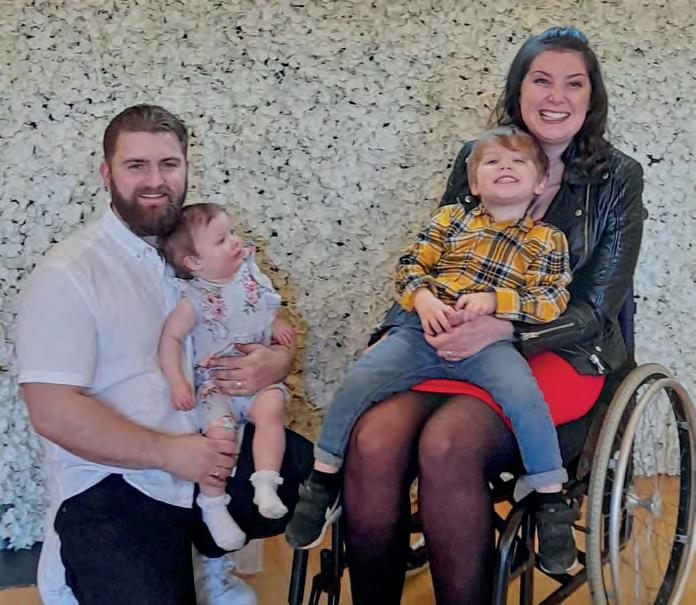
– gradually stop working over time, and mainly affects people in their 60s and 70s. It limits life expectancy, and there is no cure.
Lucy acknowledges that her symptoms are “probably worsening all the time. Mine’s so slow that it’s not really recognisable. If you see me sporadically, like once a year, then you’d notice my speech was a little bit worse, for example.” She says some days are better than others, but she misses being able to be on autopilot: “You know, when you’re busy and your mind and body just take over,” she reflects. “I can’t do that anymore. I want to snap out of it, get on and do things, but I can’t. That’s probably the most frustrating thing.”
So what’s kept Lucy going, and helped her beat the odds? “I think one of the main reasons I’m still here and haven’t given up is because of the kids,” she says. “Seeing their milestones helps me get through. Being a mum, you can’t stay in bed. You’ve got to get up, feed them, wash them, entertain them and tidy up after them all day long.”
Conceiving and birthing three
children naturally is a challenge for any person, but when you have MND, it’s kind of miraculous. In September 2024, Lucy and her husband Tommy welcomed their third child into the world. They now have three children under five, although Lucy was told her body would never handle pregnancy.
She told us: “This pregnancy was such a surprise. We chose to keep this one to ourselves till after she was born, to have some normality.” She describes recovery from the birth as “harder than the other two – it’s hard to know what’s MND and what’s actually labour. I’ve never been good with the lack of sleep, and she’s really testing that.”
Lucy is a full-time wheelchair user, and her care package hasn’t changed since her daughter was born. “A lot of it falls on my husband,” she admits. “He does everything and is there every day, he gets all the rubbish jobs – I think I’ve changed one nappy; he’s always changed every nappy.”
All the same, Lucy gives her all to her kids, from cuddles in her powerchair while she moves her legs to help relieve her little one’s colic, to
One
of the main reasons
I’m still here is because of the kids
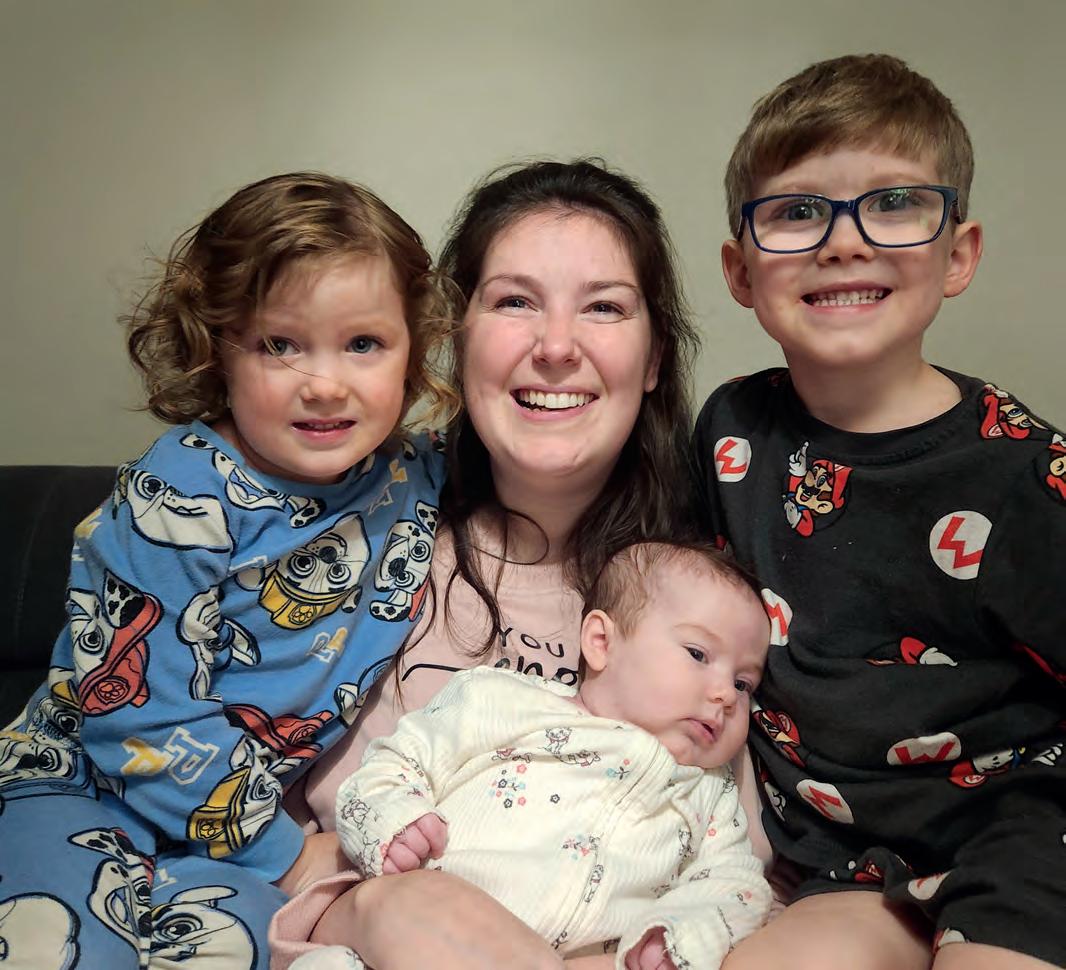
being there for them every day. What does she find most rewarding about motherhood? “That’s a hard one!” she laughs. “Probably the way you see them develop as a person. Like my son, he used to hate water and swimming. But we took him to lessons every week and he can now put his face under the water. It seems such a small thing, but because it’s taken him so long to get to that point, it’s so rewarding.”
She believes her perspective on life has changed a lot since she became a mother. “I don’t dwell on the small things anymore,” she confesses. “I don’t know what it is – you grow up and you just don’t care as much. That sounds bad, but I mean about other people’s opinions – I’m like ‘oh well!’."
Over the years, Lucy has raised thousands for charities like MND
Scotland, and has used her blog, a TV programme, speaking opportunities and her social media to raise awareness about life with the disease, which affects up to 5,000 adults in the UK at any one time.
She’s taking a break from her fundraising efforts for now – an epidural during birthing has caused some ongoing pain. But that doesn’t mean she’s not keeping herself busy. “I’ve already done the first year of an accounting degree,” she explains. “Hopefully the degree will be done by the time my youngest is in school.” Lucy’s resilience and drive are impressive, and she says: “I don’t cope well mentally when I'm not doing stuff. I get tired easily physically, but mentally if I’m not doing things then I can’t sleep.”
And as for her hopes and dreams further into the future? Lucy wants
the same as everyone else. “It goes without saying that I hope there’s a cure soon,” she reveals. “There are a lot of trials being done; I just hope one of them can either reverse MND or stop it in its tracks.” This would be lifechanging: “It would be more lifechanging for the ones that haven’t yet been diagnosed. It’s such a hard thing, being diagnosed as terminal: they tell you ‘There’s nothing we can do’, and then you’ve just got to get on with it. It’s probably the hardest thing to comprehend.”
MORE INFORMATION
Follow Lucy on Instagram: instagram.com/lucylintott1 MND Association: mndassociation.org / 0808 802 6262 MND Scotland: mndscotland.org.uk / 0141 332 3903



















Disability advocate Mark Webb has lived with Multiple Sclerosis for 32 years. Now aged 56, he talked to Editor Melissa Holmes about everyday life with MS, how his perspective on the disease has shifted over time, and his hopes for the future
QTell us more about your journey with MS.
A: Like many people with MS, I had it for many years before I was diagnosed. 15 years after experiencing my first symptoms, I was diagnosed with MS. I’m now a full-time wheelchair user. My hands are closing up; my left arm is a four out of ten, and my right arm is a seven out of ten. And fatigue and cog fog [cognitive/brain fog] are huge issues for me.
Q: What does ageing well with MS mean to you, and how do you incorporate that into your everyday life?
A: Firstly, it’s accepting MS, and that you have certain limitations. Conversely, it’s also pushing against those limitations from time to time. I used to jump out of planes. I’m not allowed to now, but this week I went indoor skydiving. There are still adventures to be had, but I accept some things are beyond me.
It’s also not descending into a hole of inactivity. It’s doing stuff, but it doesn’t have to be bonkers stuff like jumping out of planes.
Q: How has your perspective changed on managing MS?
A: I don’t regret ignoring my symptoms, because I didn’t lose anything by having those 15 years of blissful ignorance. But now I treat my symptoms. I’m very aware things like bedsores and UTIs are potentially very dangerous for me. I treat things seriously and I eat healthily, I exercise, and I accept sleep and rest as important parts of my lifestyle.
Q: What challenges have you seen people with MS dealing with as they get older?
A: I think your shrinking world is very difficult to cope with. I used that example of skydiving, and it’s great I’ve found an alternative. But I had to retire from wheelchair rugby two years ago. I was rubbish at it, but I loved it. It’s also coping with the uncertainty of what symptoms are going to pop up – it’s pretty scary and tough.
Q: Is there any practical advice you’d offer people around ageing well with MS?
A: I don’t want to come across as condescending, but a positive attitude – if you can possibly pull for it – is vital to keeping going. Accepting that you’re going to lose friends and colleagues is part of many disabilities. But having a few close friends you can rely on is incredibly important. Finally, accepting the word disability, and that you are disabled, and embracing the disabled community... those are huge.
Q: What are your hopes for the future of MS treatment?
A: One of the reasons I do drug trials is because I’m hoping for more treatments for people who feel they’re forgotten. I hope to see more advances around the end-oflife part of our journey, and to see more continuous improvements. My hope is to stop MS. I don't think they've ever cured an autoimmune disease, but to stop MS in its tracks would be wonderful.

It won’t be in time for me, but to stop MS in its tracks would be wonderful





With an ageing population and people living longer than ever before thanks to medical advances and societal change, there’s never been a better time to think about your future needs, and those of your loved ones. We take a closer look at the aspects you might like to consider
s the population ages, more and more people become disabled – in fact, 45% of adults over State Pension age are classed as disabled. You may already be disabled or be caring for a person who is, in which case you’ll be used to making plans and getting support for many aspects of everyday life. But have you thought about what you might need in the future?
Kirsty Limacher is Chief Legal
Officer at The Association of Lifetime Lawyers, a community of specialist legal professionals who support vulnerable and older people with legal advice. She explains: “As we age or encounter health challenges, legal planning becomes vital to ensure our wishes are honoured and our needs are fully met.” It’s not just legal planning you need to think about – your income, housing needs and wellbeing will change as you age.
As you age, your disability may impact your mobility differently. You may need to install home adaptations like ramps, wet rooms or hoists to ensure you can continue living in your home independently for as long as possible.
In 2021, around 25% of disabled people lived in social rent homes, while around 40% were owner occupiers. If you’re in social housing, your housing association or landlord should provide adaptations based on an assessment of your needs. But if you’re an owner occupier, you’ll need to apply for the Disabled Facilities Grant to help towards the cost of any changes you need to make.
In England, nearly 200 Home Improvement Agencies help older, disabled and vulnerable people to live a good life in their own homes for longer. In Scotland and Northern Ireland, the Independent Living Fund is designed to support individuals who have complex disabilities to live independently, while Wales offers the ENABLE scheme.
As you get older and your healthcare needs change, you can access funding from Personal Independence Payments to pay towards your care, perhaps via someone who comes to your home to provide support. This varies across the country: in Scotland for example, everyone (regardless of income or assets) receives free personal and/or nursing care if they’ve been assessed as needing it. If staying in your own home becomes too challenging, especially if you have medical needs, you can move into a care home or nursing home. Depending on your personal assets or savings, and where you live, it’s likely you’ll need to pay towards your care.
“The ongoing costs of care are a key concern for those with long-term health needs,” explains Kirsty from The Association of Lifetime Lawyers. “There are various planning options available including trusts, insurance, and annuities, but they’re not suitable for everyone. It’s worth seeking professional advice when considering lifetime planning to ensure the documents put in place are suitable for you in your circumstances and as tax efficient as possible.”
Around half of disabled people are in employment in the UK, many of whom are older. Age Without Limits says that: “Older colleagues bring incredible value to workplaces, and multi-generational teams are more productive and innovative.” However, the organisation also says that ageism is the most reported form of discrimination in UK workplaces.
If you feel ready to stop work or retire due to age or the impact of your disability, you’ll need to speak to your pension provider about accessing your private or workplace pension. You can’t receive your State Pension early if you retire due to ill health, but you may be entitled to other benefits like Universal Credit or PIP. Before you make any big decisions, consider the implications and ensure you’ll have enough money to live off.
You may have heard of Lasting Powers of Attorney. This is where, if you become unable to make decisions for yourself, you can legally appoint trusted people to do this on your behalf. “There are two types,” reveals Kirsty, “one covering health and welfare (such as medical care and where you live), and the other covering property and financial affairs (such as managing bank accounts and selling properties).”
Then of course, there’s having a valid, up to date will, which Kirsty outlines is “a fundamental part of planning for the future. This should be reviewed every five years, or when big life events occur.” She continues: “Reviewing your will makes sure it reflects your current wishes in terms of who you want to benefit, what you want to leave to people (the distribution of your assets), and tax implications.”
It’s not nice to think about, but death comes to us all, and it’s important to plan for it so your wishes are respected. Perhaps you’d rather die at home if possible, or you’d rather not be resuscitated if you’re very unwell.
Kirsty explains: “One thing that’s often overlooked is putting in place an advance decision (also known as a living will) which allows you to specify

As we age, legal planning becomes vital to ensure our wishes are honoured and our needs are fully met
your preferences for refusing medical treatment should you be unable to communicate them in the future. If you also have Lasting Powers of Attorney for health and welfare in place, you’ll need to think about how the two documents work together – your lawyer can advise you on this.”
Funeral planning can be done at any age or stage of life, and there are many options to consider. Some ideas may include a green funeral, simple cremation, celebration of life or even a FUNeral (celebrating with your loved ones while you’re still alive). Any advance planning you do will help relieve pressure on your loved ones to make decisions while they grieve.
Although some of this may seem morbid, being proactive and planning for the future means your needs – and those of your loved ones – will be taken care of.
UK: ageuk.org.uk / 0800 055 6112
Without Limits: agewithoutlimits.org
Home Improvement Agencies: findmyhia.org.uk / 0300 124 0315
Independent Living Fund: ilf.scot
The Association of Lifetime Lawyers: lifetimelawyers.org.uk




Main distributors
•Dietz Mobility
•Karma Mobility
•Ki Mobility
•Otto Bock
•Spex Seating
•Triride
•Tomcat Trikes
•Permobil
• Rehasense
•Quickie


More than 18 million adults in the UK live with deafness, hearing loss or tinnitus. Despite the prevalence of these conditions, shame can still be a significant barrier. Deaf model Georgia Meacham opens up to Kate Stevenson about why she hid her deafness for 12 years
For over a decade, Georgia Meacham kept a part of herself hidden. Even though she was gracing runways and acting opposite Gal Gadot in Wonder Woman 1984, the British model and actress lived with a secret: her deafness. Terrified of being ostracised, Georgia concealed her hearing aids – too scared to be herself in an industry where looks are everything.
“I felt this massive pressure to fit into these super rigid beauty standards that didn’t leave any room for my disability,” confesses Georgia. “I didn’t want to be seen as different.”
Until this year, Georgia relied on lipreading to get her through everyday

conversations. Even in the calmest settings, she only caught “30 to 40% of what people were saying.” Each exchange left her feeling exhausted and constantly anxious: “I pushed through and pretended to hear, but the mental toll was huge,” admits Georgia. “I tried to minimise my interactions, but it was difficult, especially when I was working long, 10-hour shoots.”
Three babies are born deaf every day in the UK but, despite those stats, Georgia was the only child with hearing aids in her school. The bullying and marginalisation she experienced in her early years shaped her into the adult she is today. It also contributed to her decision to keep her true self locked away: “I felt like I had a double personality,” she admits. “It was incredibly isolating.”
Her nightmare became real when one photographer asked her to remove her hearing aids on a day she’d forgotten to hide them. “That moment really stuck with me – it was early on in my career and underlined my fear of being judged,” recalls Georgia.
It also compounded her worries that revealing her disability would make her less employable. “Back then, there weren’t any visible role models who were open about their disabilities. I felt I had no choice but to hide it,” she remembers, adding that her heart breaks for her younger self, so affected by this narrow view. “There’s definitely more talk about inclusivity and diversity now – which is awesome – but where are the young adults rocking hearing aids on our TV screens?”

You never know who you might inspire just by being proud of who you are
These days Georgia embraces her deafness, which she says has been liberating. “It took me years to realise how much of an impact locking that part of myself away had. The turning point came when I realised I was denying myself a core part of who I am,” she shares, now using her platform to empower others.
Georgia wants young people struggling with acceptance to allow themselves the chance to shine: “Once you start to embrace your true self, you’ll really start to thrive. You never know who you might inspire just by being proud of who you are.”
rnid.org.uk











Trusted by 100,000+ card holders

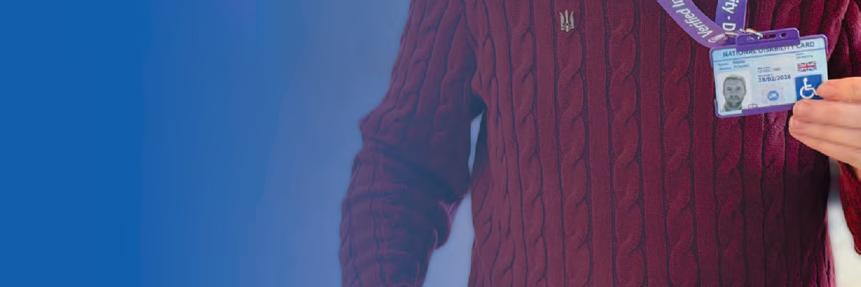


Exclusively for disabled individuals and carers
Easy to carry - fits in your wallet
Access hundreds of concessions on days out and shopping





Advanced security features
Same-day application decision & fast delivery
Emergency contact QR code
Premium lanyards available exclusively to card holders




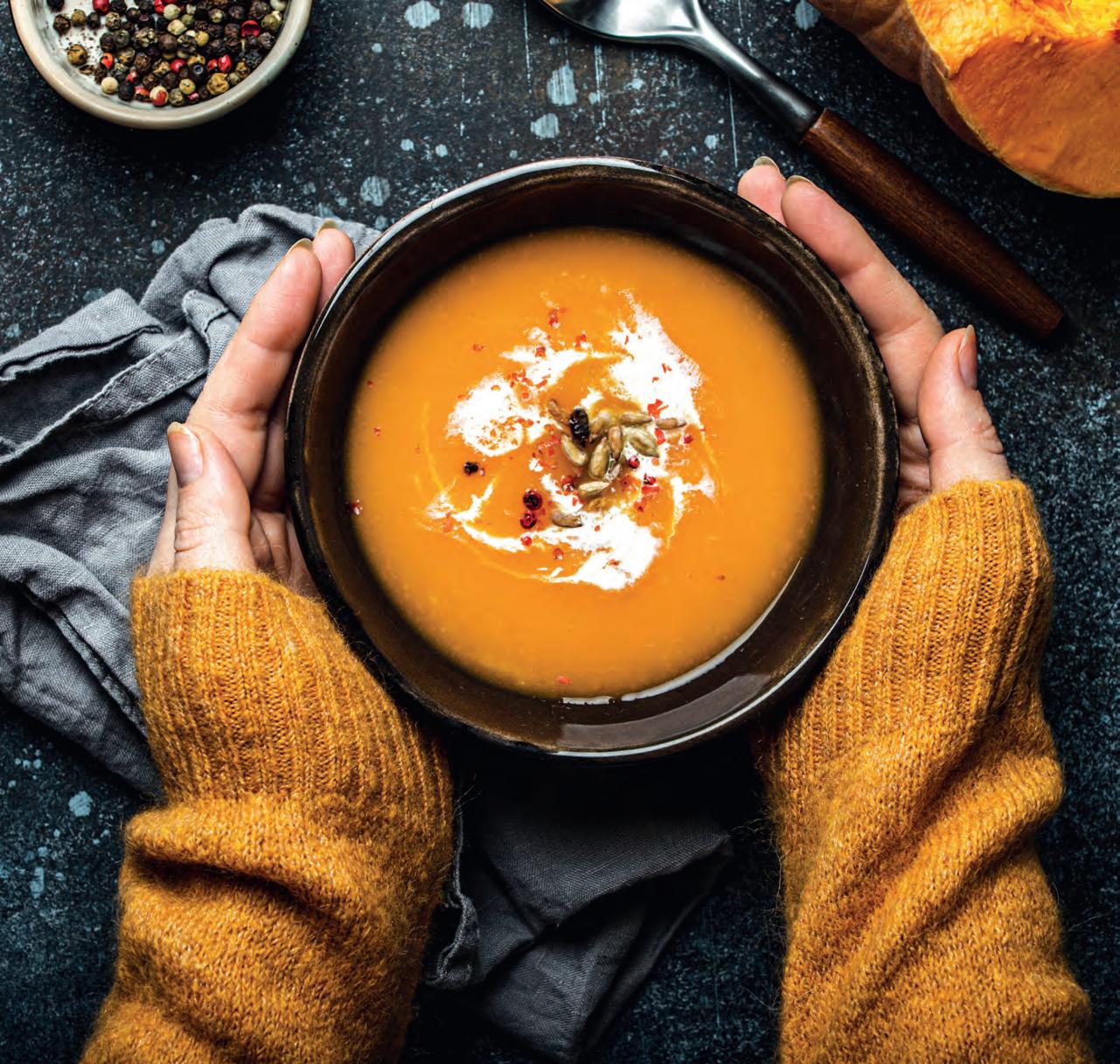
Everybody needs food…And every body needs good food! Eating a nutritious, balanced diet containing lots of variety and plenty of fruit and veg is a great way to stay healthy and boost your immune system. We share the best tips for affordable, nutritious food this winter
If you don’t know your whisk from your wok, or your spring greens from your sriracha, you’re not alone. The huge range of tools and ingredients available in stores can be confusing. If you’re disabled, you might face any number of barriers to getting into the kitchen. From struggling with access or funds being tight, to being unable to meal plan due to executive dysfunction, cooking isn’t always straightforward. But simple, home-cooked food is still the best and cheapest way to enjoy healthy eating.
Cooking from scratch can bring pleasure and frustration in equal measure but, with the popularity of ready meals and takeaway delivery services, people are abandoning their stoves in droves. KPMG found nearly a third of UK consumers have at least one takeaway a week – understandable when you can order and have a meal delivered in minutes.
However, this convenience comes at a price. Not only does it cost a lot more per portion, but takeaway food is also often loaded with excess salt, sugar, unhealthy fats and additives that won’t do your body any good.
At this time of year, it’s important to fuel your body well to help fight off infections and keep warm. Eating at least one hot meal a day, along with drinking warm drinks, can help to regulate your body temperature.
Food can also have medicinal purposes – whether it’s ‘comfort food’ like sausage and mash with heaps of veggies to load you up with vitamins, or a quick dish like homemade chicken noodle soup containing ginger, which has anti-inflammatory properties.
Frozen, dried and tinned fruits and vegetables are great – they’re often cheaper than fresh, easier to store and simple to cook. Use what you need and freeze or bag up the rest, without worrying about food going off.
If you do find some bendy carrots in the bottom of the fridge, overripe bananas in the fruit bowl, or a stale loaf in the bread bin, Love Food Hate Waste offers brilliant recipes to help you use up your leftovers and reduce the 4.7 million tonnes of perfectly edible food that’s thrown away each year in the UK.
There are plenty of healthy swaps you can make that won’t sacrifice taste but will give you a boost. Sweet potatoes are packed with vitamin A which is great for eye health and your immune system, won’t spike your blood sugar, and can even aid sleep thanks to their balance of vitamins and minerals. For a warming, cheap breakfast, try porridge oats – they’re packed with fibre and won’t cause a sugar crash mid-morning

Fuel your body well in winter to help fight off infections and keep warm
like some boxed cereals.
Reducing your consumption of meat can have an impact on your pocket and the planet. Make your money go further, eat more sustainably and enjoy a nutritious boost by adding vegetables or pulses (beans, lentils and peas) to dishes like stew, chilli, and shepherd’s or cottage pie.
Eating seasonally can help your budget as well as your health. Choosing fruits and veggies that are in season – in winter this means apples, pears, beetroot, cabbage, carrots, kale, mushrooms, squash and more – is often cheaper and more sustainable.
If you’re short of ideas for recipes or not confident in the kitchen, a quick search online will bring up thousands of recipes and cook-along videos showing techniques and timings.
Many supermarket and charity websites – including HeartUK and World Cancer Research Fund – offer cheap, healthy recipes and meal plans, or head to your local library to find plenty of cookbooks. With herbs and spices, some store cupboard staples and a smattering of fresh and frozen ingredients, you can whip up all sorts of wholesome, tasty dishes.
Once you’ve figured out your favourite dishes to cook, plan these out and create your shopping list based on the
ingredients you need. If you can afford it, double your quantities so you can batch cook – you’ll cook once, but will get several meals to store or freeze and enjoy later.
Slow cookers are helpful for this. They’re cheap to run, easy to use and hold large quantities of ingredients – you could try a simple slow cooker bean chilli, some tasty garlic and ginger chicken thighs, or a warming beef goulash. We love The Batch Lady for great recipes, meal planning tips and info on food storage.
James Coke runs thedisabledchef. com and describes home cooking as “the elixir of life.” His website features hundreds of recipes for different dishes, and he says it’s all about “encouraging you to cook and improve your general wellbeing.”
James, who has Primary Progressive Multiple Sclerosis, had this to share with us: “When I was a child, we were lucky to have a vegetable patch in our garden. My mum was an inventive cook and would make amazing soups from the vegetables we grew. When I started on my cooking journey, soup was the first dish I set my stock on. It’s incredibly nutritious, warming and probably the cheapest dish you’ll make. It’s also so versatile because of the countless tasty options out there.”
So why not take a leaf out of James’s (cook) book and get busy in the kitchen?


•
































































Whatever your age or disability, finding love can be full of ups and downs. Disabled people share their stories about the world of dating apps, meet-ups and marriage
Zara, 27
As an individual with a physical disability and Muslim too, I’ve not had any experience of dating. Don’t get me wrong, I’m very lovable, but it’s my additional needs that put people off.
I have tried apps – to be specific, Muzz, an app for single Muslims looking for their other halves, since dating is forbidden. I never got a chance to meet anyone off the app… perhaps I was too young and knew what the dangers of online dating were [sadly, Zara had money stolen by someone via online dating].
Once I did try to hide my disability. I never shared my pictures, but things were moving too fast and I had to tell him about my disability. He did not want to know me any further.
If you’re someone like me that constantly faces rejections from society, hold on to hope that – one day – true love will find you. I have a couple of friends who have disabilities and who are engaged or happily married. I look up to them.
I have Functional Neurological Disorder which leads to collapses and spasms. I’ve been looking all my life for that one person. The women I’ve gone on dates with were nice, but we’ve rarely had a second date. I was speaking to one lady; she told me she’s fallen for me, and now I find out she’s a US citizen on a work permit… I have a feeling she wants me because she wants to apply for citizenship here in the UK.
My advice is not to use apps or websites as they’re just a longwinded way to get ghosted. If you’re feeling brave, go to a speed dating event – I might try this soon.
Jude, 29
(disableddreamer.com)
“I am currently single. I’ve been on and off dating apps for a few years at different points on my queer journey, but I never stayed for long; feeling uncomfortable in my own body made it hard to feel worthy of connection. I returned to the apps as the most current version of me as a trans masc person, around July 2024.
“I have had people who find my disability interesting which can be great, but it can also come across as a desire to be a devotee, which grosses me out.
“My advice to others would be to work on loving and honouring yourself – not because it’s a replacement for relationship love, but because it puts
you in a healthier place when looking, and hopefully leads to going through less painful relationships. It also sets a bar to meet: I’ve come to enjoy my time with myself, and the person I look into dating now has to meet that enjoyment.”
My advice to others would be to work on loving and honouring yourself
Jude

Ashleigh and Wei-Kan
(residents at Staveley Birkleas specialist nursing home in Shipley, West Yorkshire)
Ashleigh, 33: “We first met at Whetley Hill Resource Centre and have been together sixteen years. Wei-Kan is so kind and, in June last year, he asked me to marry him! I was so surprised and didn’t have any inkling that he would propose; I was not expecting a proposal. I said yes straight away! I enjoyed everything about our wedding day – it was very special.”
Wei-Kan, 56: “I had been thinking about proposing for a long time – we love each other – and we had the best day.”


My hope for the future would be that I meet someone who loves in the same way that I love Emily
Nicole, 33
(iampossiblefoundation.co.uk)
“When I first went on dating apps, I didn’t know if I should hide my limb difference or not. But I chose to make it obvious and get it out of the way after some negative experiences, so I was upfront and put on my profile ‘I’m an independent mum of two who proudly identifies as a disabled woman. If you don’t like that, you can swipe the other way’ – along with a full body photo.
“I’m now in a really happy, solid relationship I found away from the apps. I have a disability
Emily, 30
(throughwriting.co.uk)
“I would like to meet someone very organically. I’m really focused on my work at the minute, so it would be good to meet someone through that.
“I’ve recently been cheated on. The comparison that I, as a disabled person, put myself through when finding out my partner had cheated on me… It just felt heavier somehow. I’ve been cheated on by almost all of my ex partners, and it’s really hard to not make that about myself and the way I look [Emily has a limb difference] – even
consultancy business and Harvey is a wheelchair basketball coach, so we were following the same people on Instagram. He started messaging me and we realised we were both going to be at a camp in Tennessee together – it was like the universe was getting involved! I went for a coffee with him, and it felt like the opposite of everything I’ve ever experienced. He’s my cheerleader, which is something I’ve never had. I’ve always felt I’ve had to keep small and stay in the background.”
though I know it’s not me, and those people have problems within themselves. I feel confident that I’m a good partner and a good person. But when it’s happened so many times, it’s difficult not to take on board.
“ My hope for the future of my relationships would be that I meet someone who loves in the same way that I love. And my advice to single disabled people looking for love would be to find someone you can connect with, who has that open and accepting frame of mind.”
This issue, we’re giving Enable readers the chance to win an annual subscription to Audible, the audiobook and podcast service

If you enjoy reading but perhaps struggle with vision or holding a book, then it’s worth entering this issue’s competition! Our prize is a 12-month subscription to Audible, worth almost £70.
Press play and step into a world of stories, podcasts and bestsellers. Membership gives you one credit a month so you can choose a book to download and keep, and you’ll get unlimited listening via the Plus Catalogue, which has thousands of Audible Originals, podcasts and select audiobooks. You’ll also have access to exclusive member-only deals, o ering up to 80% discount on selected titles.
The user-friendly app can be accessed from any device, allowing you to listen from your phone, laptop or car. Adjust the speed of narration, download titles to listen o ine, or set a timer to pause your story whenever you want.
Simply send us your name, contact details and where you picked up your copy of Enable Magazine. All entries must be received by Monday 20 January 2025. Good luck!
competitions@dcpublishing.co.uk
www.enablemagazine.co.uk/audible2025
2025
TERMS AND CONDITIONS: All entries must be received by Monday 20 January 2025. The prize is 12 months’ membership of Audible, which will be sent to the winner. The prize is non-transferable, non-refundable, there is no cash alternative and it cannot be sold to another party. The contents of the prize may differ from the images and descriptions included here. One entry per household. The publisher’s decision is final. If you do not wish to receive further communications from Enable Magazine, include ‘opt-out’ in your entry. This competition is not being run in conjunction with Audible.



Chipping Campden’s history in stone is the Cotswolds’ hidden gem - an idyllic centre for easy access to the local towns and villages, Stratford, Cheltenham, Gloucester, Oxford, Warwick & Worcester, etc.
George Barn is within no more than a 7 to 8 minute walk to the curved High Street, its inns, restaurants, shops & attractions.










Michael Haines George Barn, Blind Lane, Chipping Campden, Glos. GL55 6ED Mobile/Text: 07889 649812
Email: info@cotswoldcharm.com
Visit our website: www.cotswoldcharm.com


We now offer an extended range of Dutch short breaks and longer-stay holidays in some spectacular new locations. In the wonderful cities of Breda, The Hague, Den Bosch and Utrecht you’ll find beautiful parks, stunning historical architecture, a colourful culture - and some of the best accessible facilities in Europe.
We tailor-make each holiday to meet your needs, including an adapted hotel room with wheelchair accessible bathrooms or flat-floor showers.
Chat to us today for more details or email: enquiries@enableholidays.com
0330 380 6800 enableholidays.com

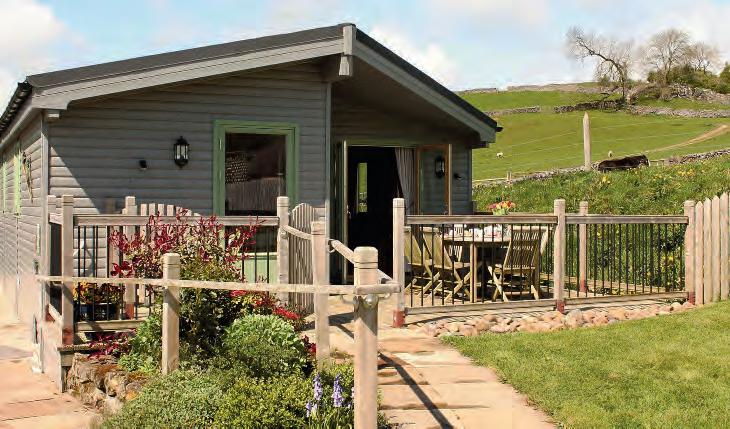

• Level drive and ramp
• Alerta Low profiling bed
• Oxford Mini 140 hoist
Beautifully presented modern self-catering bungalow in Scotland with spectacular views Fully accessible for wheelchair users, with specialist equipment Sleeps 5 Meadowsweet is near Kilmartin Glen, in the Moine Mhor National Nature Reserve Heating and linen is provided. Fibre broadband, BT TV and WiFi. Ruth Bebb ruthbebb@btinternet.com www.meadowsweetbungalow.co.uk
• Freeway Tilting Shower Chair • Fully adapted wet room • Wide doors, spacious rooms


accessible self-catering log cabins in the Peak District
hoist
equipment
in wet room shower Dogs welcome
wheelchair hire www.hoegrangeholidays.co.uk tel: 01629 540262







The cost of living crisis continues to impact disabled people, from soaring grocery prices to the cost of heating our homes. It’s concerning, but there are things you can do to help reduce your financial worries, which can be especially challenging over winter
Have you noticed the cost of your food shop ge ing more and more expensive? Or perhaps you’re worried about turning the heating on too much over the winter period as it’s become so pricey? You’re not alone – back at the start of 2024, four in ten adults reported having to spend more than usual when food shopping to get what they normally buy, according to the O ce for National Statistics.
There’s no doubt that the prices of everyday essentials are rising. And lower income families and individuals, who o en spend more of their income on food, are taking the hit – 2022 to
2023 saw the largest year-on-year drop in living standards since the 1950s. It’s all looking decidedly gloomy, with household expenses seemingly on a never-ending upward trajectory, while wages and benefits aren’t ge ing a boost in line with these increased costs.
So how are we supposed to manage? Food, shelter and warmth are basic human needs, but they come at a price. Trying to eat a balanced, nutritious diet can prove challenging, especially if preparing food isn’t your forte or accessing a kitchen is di cult.
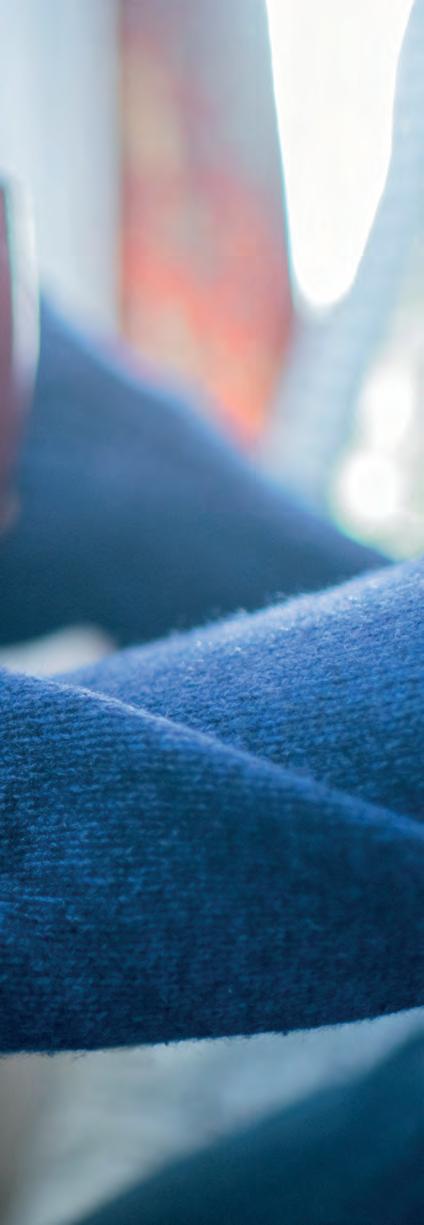
Turn to page 41 of this issue of Enable to read our tips, along with expert advice, on how to eat well this winter without stretching your purse strings too far.
If you have a fixed income of wages and/or benefits, getting an effective household budget in place is essential. The budget planner at moneyhelper. org.uk lets you keep track of your money, as well as suggesting ways you can improve your finances. Tools like this can help you see where you might be wasting money, through unused subscriptions or excessive spending on a regular habit, as well as enabling you to be realistic about budgeting for annual events such as Christmas, birthdays and special occasions.
Budgeting might also help you look at any debt you owe. Citizens Advice urges you to prioritise sorting out problems with your energy bills, council tax or housing costs first, as these are more urgent than debts like credit cards or loans. Speak to your lenders to see if they’re able to make things more manageable for you by reducing your debt or giving you longer to pay.
MoneySavingExpert estimates that £23 billion worth of income-related benefits and social tariffs go unclaimed each year in the UK. Many working families don’t claim Universal Credit, for example, while Attendance Allowance, council tax support and broadband social tariffs are often overlooked by households.
Maximising your income is really important – head to entitledto.org.uk to check if you’re missing out on any benefits, or speak to your local disability or advocacy charity, who can help you apply for benefits you might be missing out on.
£23 billion worth of income-related benefits and social tariffs go unclaimed each year in the UK
In wintertime, keeping warm can be a challenge, especially with the high cost of energy. Often, the advice is to “heat the person, not the room”, but this doesn’t always work for disabled people whose health issues can be exacerbated in cold weather.
Let’s start with the basics. Ensure your home is ready for winter by installing loft insulation, using draught excluders or tape on windows and doors, and having your central heating system serviced annually. You may be entitled to funding via the Warm Homes Local Grant, Home Upgrade Grant or
Boiler Upgrade Scheme to help improve energy efficiency.
You can also reduce your spending on energy bills by looking at energy saving techniques. Some medical equipment and medication storage fridges can never be switched off. But you can consider turning other electrical devices – like your TV or router – off at the plug, rather than leaving them on standby. Switching off lights and even filling a large flask with boiling water to last you the day, rather than repeatedly boiling small amounts in the kettle, will also help shave money off your fuel bill.
If you’re on certain benefits, you may be entitled to a Winter Fuel Payment, which is often credited to your energy supplier account. Then there’s the Cold Weather Payment for people on certain benefits, which pays out £25 if the average temperature in your area doesn’t get above freezing over seven consecutive days.
Keeping moving regularly will help to keep your body warm – this might mean a chair workout, some gentle stretching, or even housework. Visit weareundefeatable.co.uk for ideas on how to get active when you have a health condition. Dressing in layers, eating nourishing foods and aiming to eat at least one hot meal per day with warm drinks will work towards helping you maintain a steady body temperature too.
If you or the person you care for needs a lot of prescriptions and you live in England, a Prescription Prepayment Certificate (PPC) could help you save money. You can buy a PPC for £114.50 to cover you for 12 months, no matter how many items you need. And, if money problems are causing you real stress, don’t be afraid to reach out for help. Contacting your GP, social work team if you have one, or a money advice charity can help you manage how you’re feeling and put some real solutions in place to help relieve the pressure.

















Disabled adults are twice as likely to be inactive compared to non-disabled adults. In an exclusive interview with Enable, Adele Roberts and Richard Whitehead MBE sit down with Kate Stevenson to discuss the changes needed to make sport more accessible for all
Inclusivity. It’s often used as a buzzword, so organisations can ensure they’re doing the bare minimum, but rarely more. However, true inclusivity goes beyond ticking boxes. It requires a commitment to understanding our diverse perspectives. No one should feel marginalised, especially in something as unifying as sport. Yet unfortunately, Adele Roberts and Richard Whitehead MBE know this feeling all too well.
Via their documentary Dare to Defy, they’re taking a stand in a bid to make sport spaces more welcoming for everyone. Together, they’re challenging stereotypes and exploring the barriers faced by underrepresented communities.
Throughout his athletic career, Richard, a decorated marathon runner, has faced his fair share of discrimination. At the London 2012 Paralympics, he was unable to take part in the marathon as there was no category for leg amputees. He was refused permission by the IPC to compete against upper-body amputees, instead turning to sprinting so he could be involved. While Richard won the gold medal in the 200m T42 event – and set
a world record while he was at it – his story reflects the difficulties faced by other disabled people.
“Sport should represent everyone,” he asserts. “It’s not just about elite performance; it’s about creating opportunities at all levels, especially at grassroots where people first experience sport.” And Richard’s not just talking the talk, he’s walking the walk himself. Through The Richard Whitehead Foundation, via a series of community projects, he’s breaking down barriers to help people access sport and change what they think is possible. Like he says: “Seeing is believing.”
Like Richard, Adele is using her platform to champion diversity in sports. As a member of the LGBTQ+ community and a bowel cancer survivor, she’s always understood the importance of visibility in the media. She was the first person to feature on the cover of Women’s Health with a visible stoma bag (hers is called Audrey), and the fastest female to complete a marathon with an ileostomy.
“I feel privileged to be part of the invisible disability community,” adds Adele. “It’s really helped me see the world with a new perspective, especially when it comes to staying active.”
Silence has never sat well with Adele, and she’s now using her voice to support other marginalised groups through the Amazon Prime series with Richard. “It’s been such an eye-opening journey for me,” she reveals, noting that her own presence in sport has often challenged stereotypes. “Inclusivity isn’t just about being visible. It’s about making sure everyone, regardless of their identity, feels welcomed and supported. I’m proud to be working with Nissan to help make that happen.”
Both Richard and Adele emphasise the importance of grassroots initiatives. Adele, who has faced challenges as a gay woman in sport, believes inclusion starts at a foundational level. “Grassroots sports are the entry point for so many,” she points out. “If we can make those spaces more welcoming, it sets the tone for inclusivity throughout the sporting world.”
“We need to educate leaders, coaches, and players about diversity and inclusion, so it becomes a natural
part of sporting culture,” agrees Richard. “There are so many barriers for disabled people – even getting out the door and into sports facilities can be an obstacle. We need to do better.”
To achieve the truly inclusive sports environment Richard envisions, he believes change must start at the top. This means putting disabled athletes in decision-making roles: “People with lived experiences should be shaping the policies and structures that affect them,” he argues.
Meanwhile, Adele wants to see the integration between disability and sport become standard. “It’s not just about having policies in place,” she explains. “It’s about changing attitudes and ensuring that inclusivity is practised, not just preached.”
“And holding people to account when they aren’t inclusive,” agrees Richard.
Looking forward, Richard and Adele
are optimistic about the potential for change. The reality is that threequarters of the disabled community want to be more active, but systemic barriers prevent them from doing so. The Nissan documentary is proof that, when disabled people are treated equally in sport, they’re able to unlock their full potential.
It can’t stop here though, as Richard says: “We need to ensure the progress we make today lasts for future generations.”
Instead, he and Adele encourage you to defy the stereotypes you face when trying to play sport. It will require a “collective effort,” but you owe it to yourself to challenge the status quo –everyone deserves to feel welcome and wanted.
As Adele puts it: “Sport should be a place where everyone can thrive. When we include everyone, we all win.”
Stream all episodes of Dare to Defy exclusively on Prime video.













Loopwheels Urban are wheelchair wheels with internal suspension. They’re designed to handle the uneven terrain many people encounter daily, providing a smoother ride. They work whether you’re manually propelling or using a power a achment. The three-spring system constantly adjusts to terrain, cushioning the rider from bumps or potholes. What’s more, they’re designed, engineered and built to order in the UK.
£2,138 to £2,696 / loopwheels.com
























Fresh Wipes have been designed for people who are unable to shower or take a bath. Developed in 2020 as a grown-up alternative to baby wipes, Fresh Wipes o er a range of rinse-free body and hair washing solutions to help you stay fresh and clean. All products are vegan friendly and not tested on animals. The large, moisture-saturated wipes are available in three gorgeous fragrances (or unscented), plus they’re biodegradable and plastic-free. From £5.99 / freshwipes.co.uk

Cosyfeet o er a wide range of comfortable, roomy footwear for people with swollen feet. With shoes, slippers, trainers and boots to choose from, they’re wider, deeper and roomier than most other brands, as well as being stylish and practical. The full range is available online, or you can try before you buy by visiting one of Cosyfeet’s many stockists across the country – just use the handy stockist finder tool on their website.
Prices vary / cosyfeet.com

The Living Paintings Trust creates beautiful, tactile Touch to See books for blind and partially sighted people of all ages. Living Paintings o ers a free library, enabling blind and partially sighted people to borrow and return the books free of charge through the post. Explore the tactile images, and listen to the narration to enjoy the stories of the pictures. Library is free to join and use / livingpaintings.org

Oak Tree Mobility has upgraded their range of adjustable beds with Mammoth’s Medical Grade™ foam ma resses. The beds feature tailor-made comfort, with ma resses cut to size, and silver antibacterial technology. Enjoy a great night’s sleep, since Mammoth’s Medical Grade™ foam is the only ma ress clinically shown to improve sleep.
Prices vary / oaktreemobility.co.uk/ mammoth-ma ress / 0800 999 8728
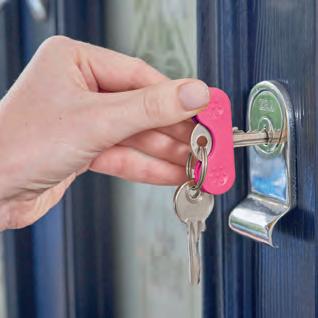
Dext’s Keywing Key Turner makes it twice as easy to turn a key. The bright grips are easy to find, and instantly convert flat, Yale-style keys into an easy-grip thumb turn. The comfortable dimpled domes give fingers a firm grip which reduces fumbling and dropping, while the nylon body provides a ‘warm’ touch point for cold fingers. The Keywing Key Turner is perfect for people who have arthritis, Parkinson’s, MS or weak hands.
From £12.49 / amazon.co.uk
16 JANUARY TO 2 FEBRUARY
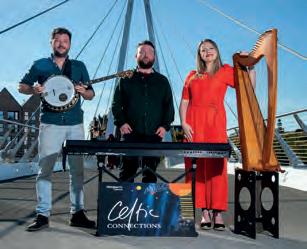
Glasgow
The UK’s premier celebration of Celtic music features everything from traditional and folk music to Americana, jazz and soul. Taking place in a variety of places across the vibrant city of Glasgow, many of Celtic Connections’ venues are accessible, including Glasgow Royal Concert Hall, Old Fruitmarket and City Halls. The perfect festival for live music fans. Prices vary / celticconnections.com
EIS, She eld
This inclusive event invites anyone with a physical disability to discover sport in a safe, welcoming and friendly environment. People aged from age five to adult can take part in a selection of wheelchair sports, including wheelchair rugby league with She eld Eagles, boccia with She eld Smashers, table tennis, and para ice hockey. These activities are all about having fun, learning new skills and receiving coaching. All participants will receive lunch and a t-shirt, and activities will be split into appropriate age groups. Min £5 donation / wheelpower.org.uk
Place2Be created Children’s Mental Health Week to empower, equip and give a voice to all children and young people in the UK. This year’s theme is ‘Know Yourself, Grow Yourself’. Free resources – including assembly slides and an art activity – are available for schools, organisations and families, which feature the loveable characters from Inside Out 2. They’re all designed to help young people discover how ge ing to know who they are can help them to build resilience, grow and develop, by embracing selfawareness and exploring what it means to them. childrensmentalhealthweek.org.uk
The North Warehouse, Manchester Let David Hockney take you on a personal journey through 60 years of his art. This vibrant, immersive exhibition features huge, state-of-the-art projections and a revolutionary sound system, inviting you to experience the world through the legendary artist’s eyes and process. Access bookings are available, and there’s step-free access with open captions visible at all times, along with scheduled BSL and audio described showings. From £10 / factoryinternational.org

Time to Talk Day encourages us all to open up, talk and listen – it’s the nation’s biggest mental health conversation. Happening every year, it’s a day for friends, families, communities, and workplaces to come together to talk, listen and change lives. Run by Mind and Rethink Mental Illness, #TimeToTalk events are run across the country. To find out more and discover useful resources, visit the website. timetotalkday.co.uk


LITERATURE & SPOKEN WORD
FEB – JUN
LAURA BATES
MAGGIE O’FARRELL
NNEDI OKORAFOR
TORREY PETERS
KIT DE WAAL
PLUS: INTERNATIONAL BOOKER PRIZE SHORTLIST READINGS
MOTH: GRANDSLAM


• Audio described performances
• BSL interpreted performances
• Captioned performances
• Relaxed performances
• Hearing assistance
• Touch tours
• Essential companions Find out more at aberdeenperformingarts.com/access






MG puts a spring in the step of the supermini market with its fine driving, hybrid-powered MG3

There’s a modern look and feel to the cabin of the MG3 thanks to its rotary gear selector, digital dash display and a 10.25 inch touchscreen infotainment monitor. The higher spec Trophy model available through Motability also comes with synthetic leather upholstery with cloth inserts to add a plusher style. The front seats in the Trophy are heated too, along with the steering wheel, so it’s well equipped for the price. One criticism is that almost every function is worked through the touchscreen. This can be distracting, and we’d prefer actual bu ons for the heating controls. Another downside of the MG3
centres on its steering wheel, which adjusts for angle but not reach, so it can be tricky to find the ideal driving position. The driver’s vision is fine to the front and sides, but looking over your shoulder is limited by the thick rear pillars. For parking, you get a reversing camera with a 360 degree display and rear sensors. In the back, there’s decent room for adults, though a Skoda Fabia has more generous head room. As for the boot, it’s a decent size at 293 litres and the load sill is not very high. However, there is a drop to the boot floor, and the rear seat back is a one-piece item rather than spli ing 60/40 as in most of the MG’s rivals.



There is a lower spec MG3 SE model, but Motability only offers the better kitted Trophy model. This means you get the MG Pilot range of driver safety aids, 16 inch alloy wheels, electric windows all-round, remote central locking, heated door mirrors, rear parking sensors, and a 360 degree view parking camera. You also benefit from extra safety kit such as the rear cross traffic alert, blind spot detection, and lane change assist. Automatic windscreen wipers are handy, while rear privacy glass and keyless entry and ignition add an upscale feel. The infotainment touchscreen has DAB radio, plus heated seats and steering wheel, and synthetic leather upholstery.
The MG MG3 1.5 Hybrid Trophy fivedoor automatic is available through the Motability scheme with an advance payment of £499. The MG3 uses the total mobility allowance of the higher rate mobility part of your weekly Personal Independence Payment. Find out more at motability.co.uk

The combination of a 1.5 litre petrol engine and electric motor give the MG3 a very peppy total power output of 194hp. While that sounds like hot hatch territory, the MG3 isn’t quite that fast and needs eight seconds to cover the 0-62mph dash. That’s still decent though, and better than all of its direct rivals, so you never feel the MG is short on power for overtaking or joining the flow of a motorway.
In town, the MG3 spends much of its time using battery power, so it’s very quiet and relaxed. When the petrol engine comes into play, it does so smoothly, while the standard threespeed automatic gearbox adds to the laid-back aura of the MG3.
Show the MG3 a twisty back road, however, and it deals with it in a surprisingly sprightly manner thanks to well controlled suspension. It’s a little firmer in all conditions than a Volkswagen Polo, but never uncomfortable or unrefined. Better still, you should easily see mid-50s fuel consumption.
The MG3 doesn’t excel in any single area, but it’s a strong all-round small car with smooth, efficient hybrid power.


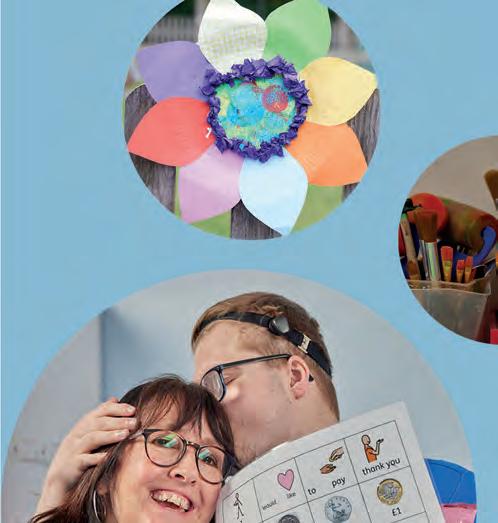






Jane is the founder of Evenbreak, a social enterprise run by and for disabled people, with a specialist job board and a career hive.
Send your questions to editor@dcpublishing.co.uk

I am disabled, but it’s not obvious from the outside. Do I have to tell my employer about it? I’m worried I might be treated differently and be discriminated against.
You are under no legal obligation to tell your employer about your invisible disability, unless it prevents you from doing something key to your job role, or affects health and safety at work.
For example, a firefighter will need to have excellent physical strength and mobility to use rescue equipment, and also to wear the heavy protective gear needed to tackle emergency situations. If you don’t have physical strength and mobility, you can’t safely enter a burning building to rescue others. You could even be a risk to your colleagues. In this case, there are no adjustments that could be made to the role or the safety equipment that would be considered reasonable.
Fortunately, not many jobs fall into
this category. Most jobs that require this level of physicality will have an occupational health screening as part of the process. If you did have your heart set on a role as a firefighter, then it may be worth talking to the fire service about different roles within the team, such as call handling or fire safety education. These are discussions that should occur before recruitment.
The other type of discussion that may be necessary by law would be for health and safety purposes. If you’re in a large organisation, these conversations may be kept confidential with HR, or with your line manager in smaller organisations.
For example, a full-time wheelchair user will have their disability ‘disclosed by default’ if they have attended face to face interviews but – since many
Being open about your disability makes it easier for others to be open about theirs
people use wheelchairs for fluctuating conditions, and with online interviews becoming more popular – it may transpire that your employer doesn’t know you might need a fire evacuation plan until the day the alarm goes off. It’s your legal duty to make sure your health and safety needs – and how they might impact the health and safety needs of your colleagues – are made clear to your employer.
Other than these two situations, it’s entirely up to you. If it would be easier for you to have workplace adjustments, such as assistive technology or flexible hours, then it may well be worth letting your line manager know.
Being open about your own disability can make it easier for others to be open about theirs but, of course, this is an individual choice.
Visit Evenbreak (evenbreak.co.uk) for jobs with employers who are actively trying to attract disabled candidates, and to set up alerts for the kinds of role you are interested in. For personalised career support, check out Evenbreak’s Career Hive (hive.evenbreak.co.uk). These services are free of charge.

We deliver exceptional programmes and a rich learning environment for young people (16 to 25 years), with special educational needs and disabilities, in preparation for adulthood.
• Moderate, severe, complex or profound and multiple learning disabilities (CLD and PMLD)
• Autism and more

Exceptional pastoral care and student support
Excellent outcomes, exceeding national averages
Independence development
Unrivalled sports, leisure and wellbeing activities



We support our young people to achieve and challenge them to do more. Our students regularly exceed what they and others thought possible.









Holidays can be a great opportunity to relax with friends, meet new people and explore local attractions. We have highly trained staff that can cater for individual needs.
We will help ensure you undertake activities around your preferences and wishes so you will want to come back again and again.







We build your programme of activities around what you enjoy doing. It may include:
For generations, disabled young people have been written off when it comes to careers, or have fallen through support service cracks while transitioning from education to work. A new report from the House of Lords aims to remedy the situation
Many of us remember the often abysmal careers advice we got at school.
For thousands of disabled school leavers, discussions about future careers have often been more than strained. And still the disability employment gap remains – according to Leonard Cheshire, the difference in employment rates of disabled people and non-disabled people is 22% for those aged 18-24.
The House of Lords Public Services Committee recently produced a report which highlights the critical challenges young people face during this transitional period.
Think Work First: The Transition from Education to Work for Young Disabled People made several key findings, including identifying the systemic barriers that start in early education and continue into the workplace. Limited access to a tailored careers service is outlined as a key barrier; along with inaccessible recruitment processes, and low expectations placed on young disabled people by education and careers services.
Alumni from Leonard Cheshire’s Change 100 programme shared this frustration, with one reporting that

“a university disability adviser had focused on what they could not do; the adviser was felt to focus more on dissuading them than looking for reasonable adjustments or equipment/technology to enable them.”
Examples like this highlight the value of the report, which contains 36 recommendations focusing on improving the experience of transitioning from education to work.
One recommendation is to improve the Access to Work scheme; the funding available for workplace adaptations or in-work support. The backlog in applications – which was as high as 36,000 in May 2024 – is leaving people feeling unprepared and without the resources they need to succeed.
The report also recommends enhancing the training given to Disability Employment Advisors, to improve their understanding of the unique barriers young disabled people face. It also calls on the government to honour the previous government’s commitment to double the number of supported internships – which provide meaningful work experience to many – and widen eligibility for the programme.
Too many disabled people are being written off, or falling through the cracks
If implemented, the report’s recommendations could reshape the employment landscape for disabled people. Improving turnaround time for Access to Work applications would allow young disabled workers to thrive from day one of their new role. Training for Disability Employment Advisers and expanded internships would foster inclusivity and raise employer confidence.
Moving the focus onto aspirations and empowerment would help close the disability employment gap and build a more inclusive economy.
The recommendations outlined in Think Work First have the potential to provide disabled youth with the support and opportunities they need to transition smoothly from education to meaningful employment, paving the way for a future where everyone can thrive professionally.
yslexia – a learning di culty that mainly causes problems with reading, writing and spelling – a ects up to one in ten people in the UK. One of the most famous Dyslexic Brits is billionaire founder of Virgin Group Richard Branson, who has said “I simply wouldn’t be where I am today if I wasn’t Dyslexic.”
That’s because Branson recognises that many people with Dyslexia have great imaginations, creativity and problem-solving skills – but the world doesn’t always see the benefits that Dyslexia can bring.
“Current approaches in education o en prioritise conventional skills like memorising and recalling facts and figures, and performing well under timed conditions,” he has said. “I was judged by these narrow criteria at school, and I was made to feel stupid. If I had let my exam grades define me, I can’t imagine where I’d be now.”
Branson has joined forces with charity Made by Dyslexia to launch a new learning platform – the University of Dyslexic Thinking. Hosted by the Open University, it’s available to access for free from anywhere across the world, and aims to teach people more about Dyslexic Thinking Skills.
So what is Dyslexic Thinking? The phrase refers to the creative thinking, communication and interpersonal skills, adaptability and resilience, and complex problem-solving skills that so
If I had let my exam grades define me, I can’t imagine where I’d be now
Richard Branson

We learn more about Dyslexic Thinking, and how it’s needed in the modern working world
many Dyslexic people have. These so skills help to move business forward, and research has found that these a ributes are the most sought-a er in every job, in every sector, globally.
Dyslexic Thinking is becoming increasingly important as we move into a fi h industrial revolution, also known as Industry 5.0. This new phase is characterised by collaboration between humans and advanced technology – especially AI. Because, while AI only assimilates human knowledge, Dyslexic Thinking innovates. Kate Griggs, Founder of Made By Dyslexia, agrees: “The world needs to rethink the human intelligence needed in the 5.0 world. Workplaces and education must transform to value and empower this di erent thinking, not disadvantage it.”
The University of Dyslexic Thinking – or DyslexicU – o ers a range of online courses which are “the kind of lessons I wish I was taught in the classroom,” as Branson said at the launch. Courses in Entrepreneurs and Start-Up Mentality, and another on Changemakers and Activism are available now on DyslexicU, with more subjects coming soon covering topics such as storytelling, sport, fashion, culinary arts, and music.
Anyone can access DyslexicU, as Branson explains: “You might be a Dyslexic looking to learn more about your Dyslexic Thinking skills and apply them to di erent industries, or someone who isn’t Dyslexic but is curious to understand how this kind of thinking works in action, and why these skills are more valuable than ever before.”
We’ve equality at our core. We’ve been named as a disability confident employer by Jobcentre Plus and have a positive attitude towards job applications from disabled people.
As we progress, we’ll continue to improve the way that we support our staff, customers, and stakeholders, regardless of disability, gender, ethnicity, age, religion, or sexual orientation.
Our Diversity and Inclusion strategy is a priority at RoS. It’s not a one off or an event, it is an ongoing process, and we will work for our colleagues to feel safe, supported and included at work.
We want to be an employer of choice, attracting and retaining the best and widest possible pool of talent.
ros.gov.uk/about/careers













Matt
Pierri founded Sociability after an accessibility project he
started while
studying at Oxford
showed true business potential. We caught up with the young entrepreneur to learn more about his app and what life is like as a business owner
While considering university options for Oxford, wheelchair user Matt Pierri “went through this very tedious task of individually emailing 38 different colleges to ask whether they had access to bedrooms, bathrooms, dining rooms and libraries,” to find out which college would be accessible to him. That research led to a bold business idea which is now changing lives for disabled people.
Matt’s frustration – and the fact that very few colleges had answers to his questions – led to a project which saw more than 200 students volunteer to gather accessibility information. “The university took that on and finished the resource, so there’s now a college accessibility guide,” Matt tells us.
But he wasn’t finished there. “In 2019 I decided I can probably turn this into a company and take it beyond Oxford,” Matt enthuses. Sociability soon started to take shape; moving to London in 2020, obtaining investment, and hiring staff to develop, build and market the app.
Some of the best business ideas come out of solving problems, and Matt’s personal problem of addressing accessibility at university has expanded to become a slick, user friendly app. Of his team, he says: “We need people who are creative and passionate, but the main thing is everybody is really committed to solving the problem.”
The app, which crowdsources accessibility data via sociable ‘mapping days’ involving coffee and cake, is really making a difference.
“It’s nice to see the anxiety it takes off people,” Matt admits. “Maybe they’ve had a couple of problematic experiences so they haven’t gone out.” But, after using the app: “That first positive experience leads to a second and third, and they start to gain that independence and momentum.”
The response from venues has been brilliant, with many business owners looking at accessibility from a fresh perspective thanks to Sociability. “It’s not that they don’t want to support the concept of accessibility,” he tells Enable. “They’re frightened about getting it wrong. It’s that leap of faith –if you build accessible venues, people will come.”
Matt and his team have created relationships with other service providers, like restaurant booking apps. This creates revenue for Sociability, which is free for users.
Matt outlines: “It’s hard for me to use a restaurant booking site – I don’t know if I can get in, move around, or use the toilet. The booking platforms don’t have this information; they don’t know what to collect. We don’t have a booking site; we don’t know how to take bookings. We mutually work together, by licensing our data to third parties to unlock their platforms for disabled people.”
And Matt has great plans for the future, with more destinations across the UK to map, a focus on driving “customer delight”, and scaling the impact of the business. He feels disabled people make great entrepreneurs: “You spend your whole day solving problems – problems nondisabled people have never thought of, or you aren’t prepared for,” he says. “You have to really feel the passion to solve the problem,” he suggests, “and just believe in yourself.”

Disabled people are naturally great entrepreneurs –you spend your whole day solving problems


























